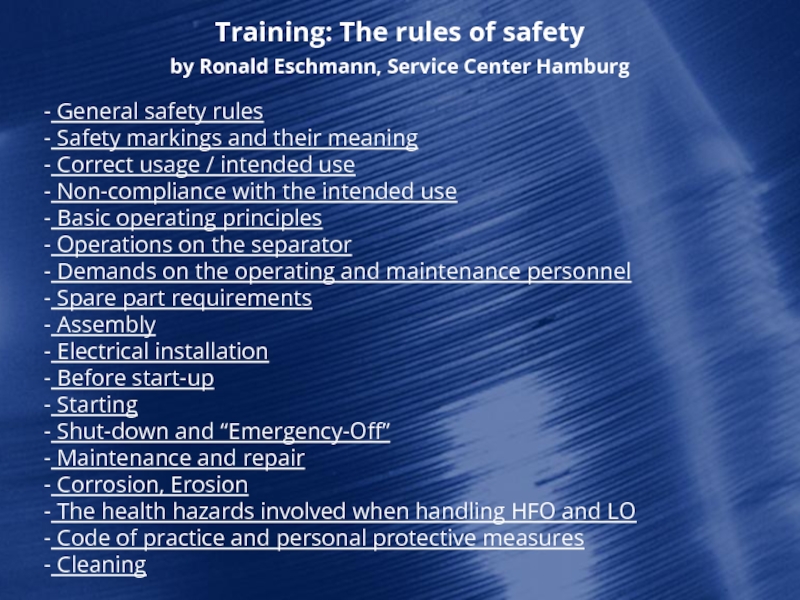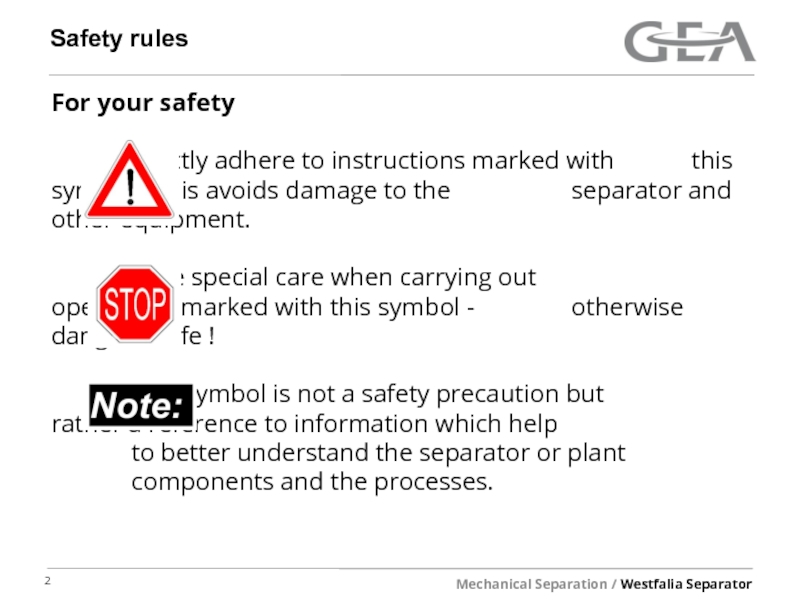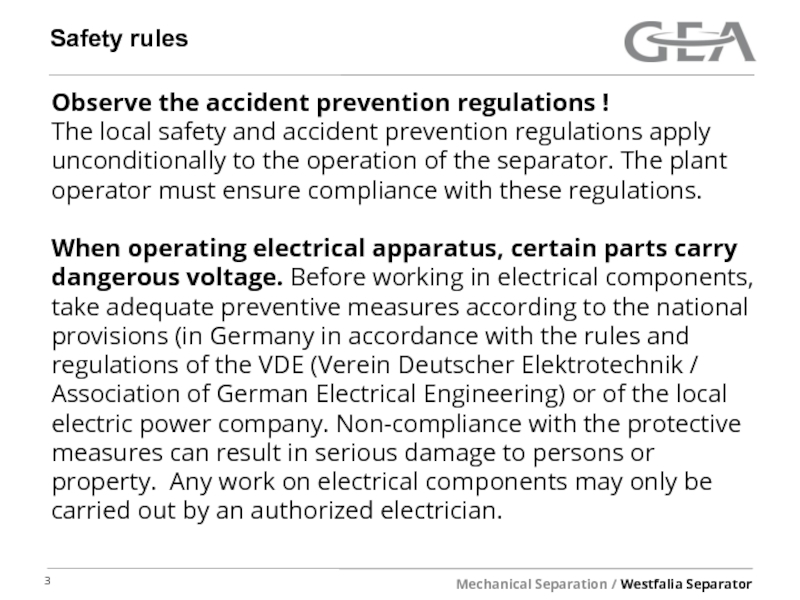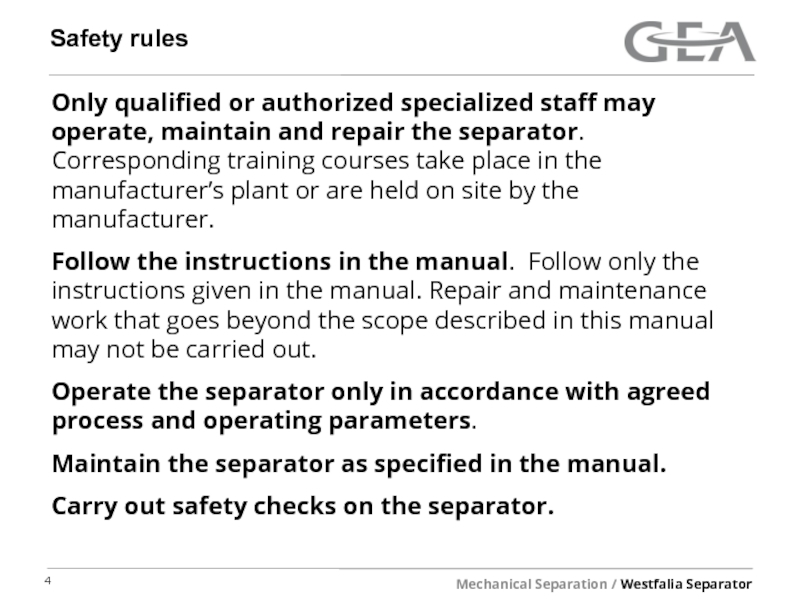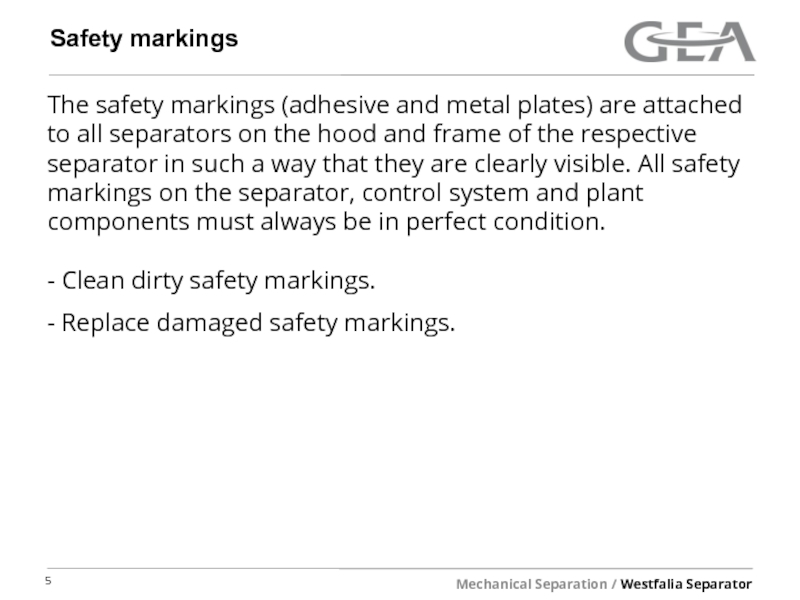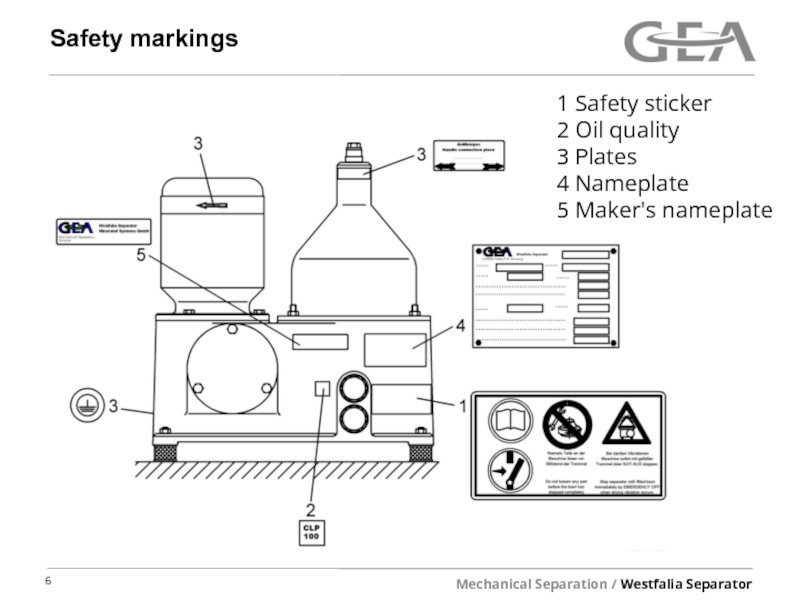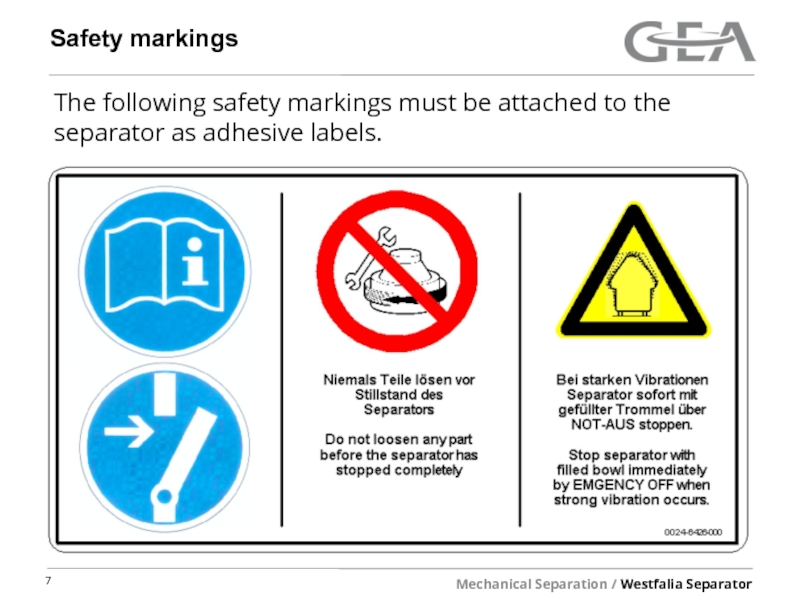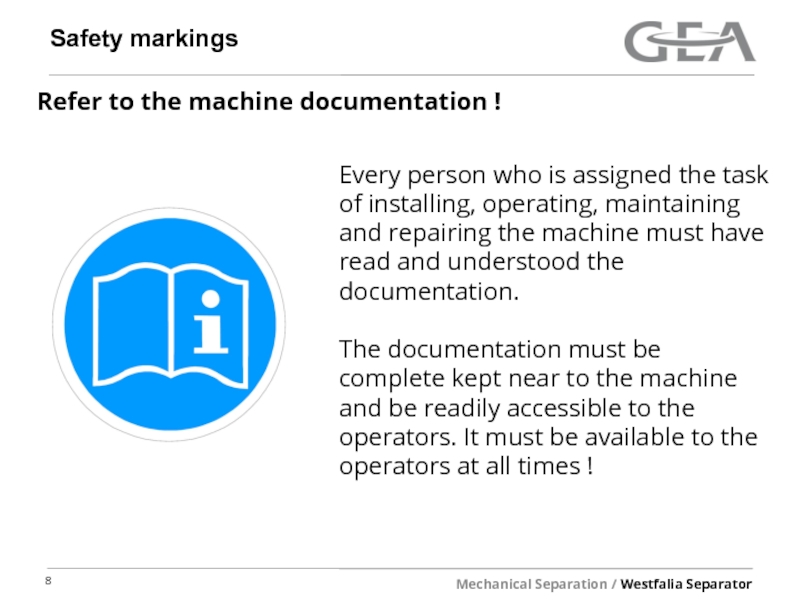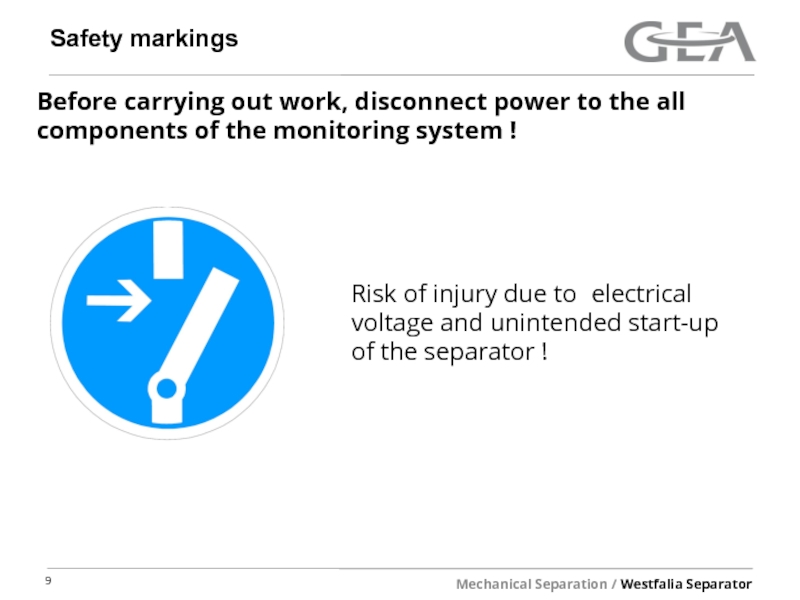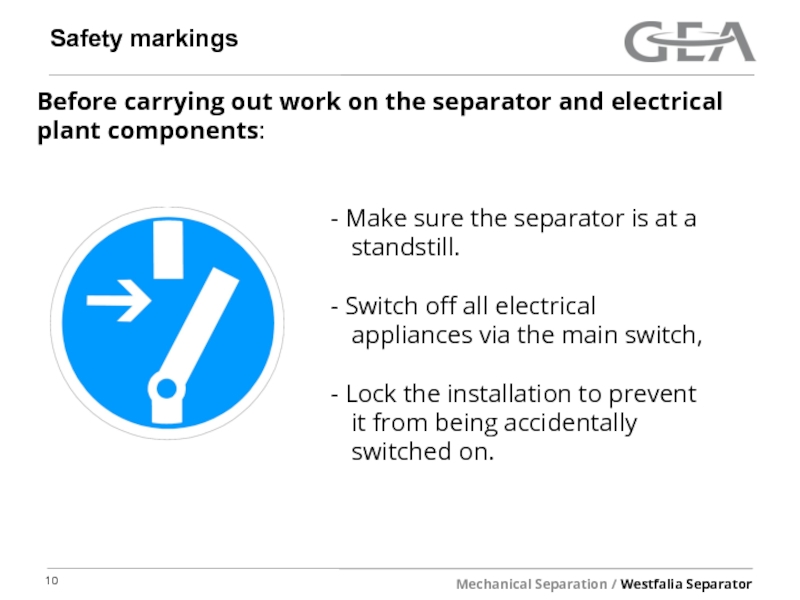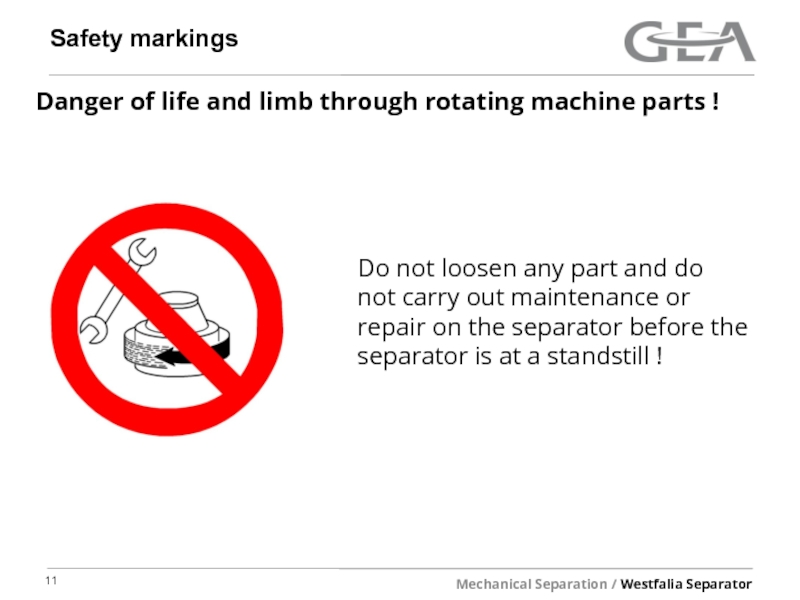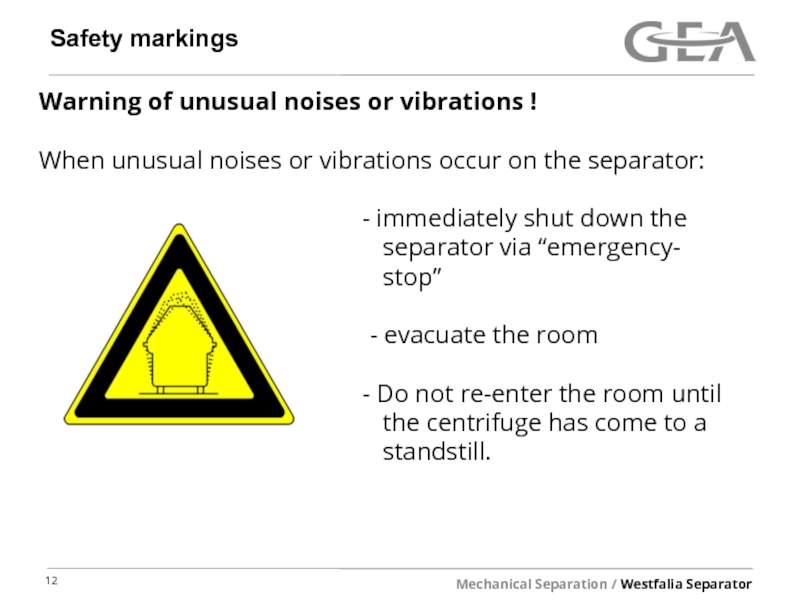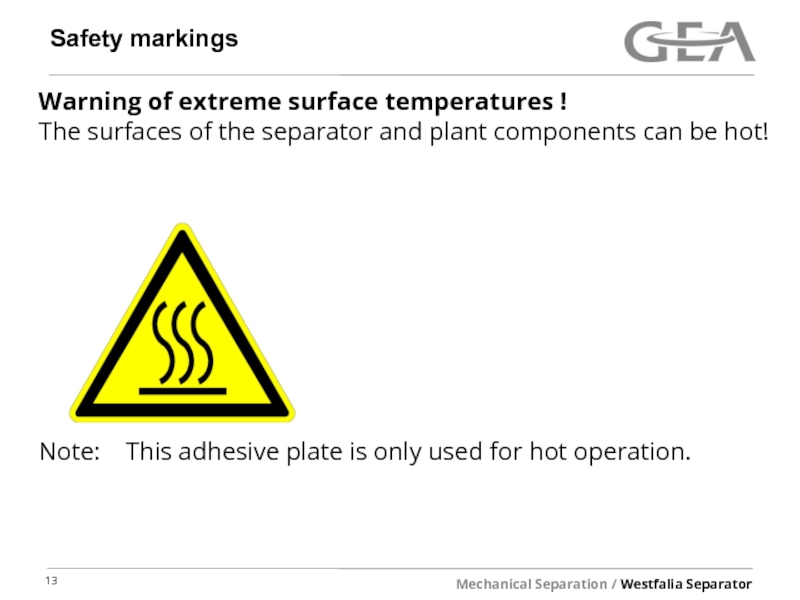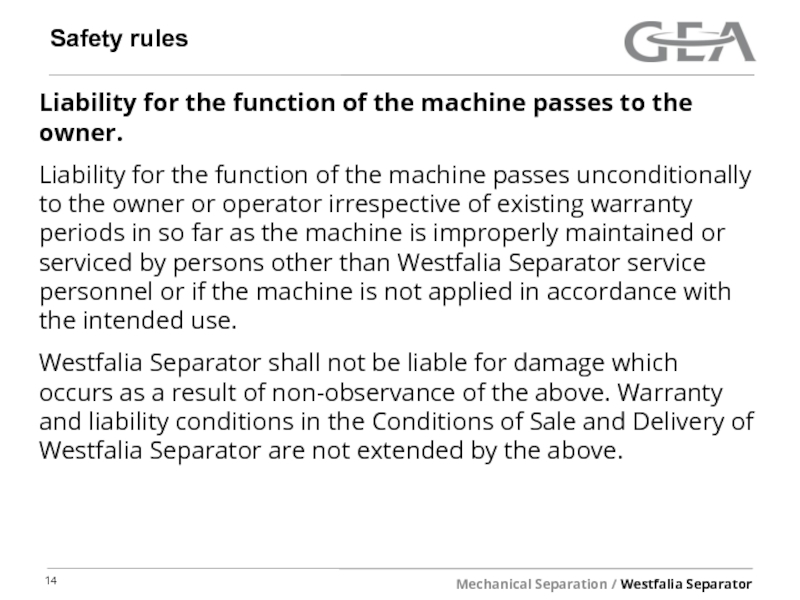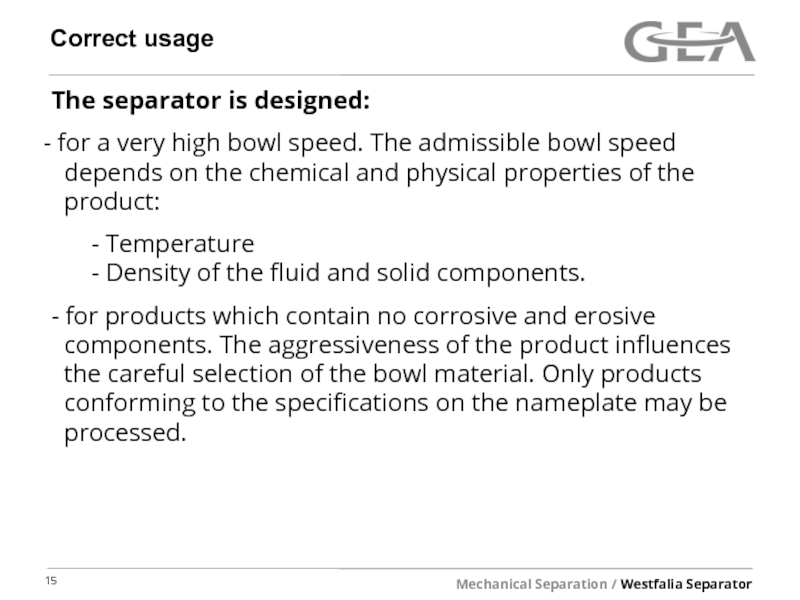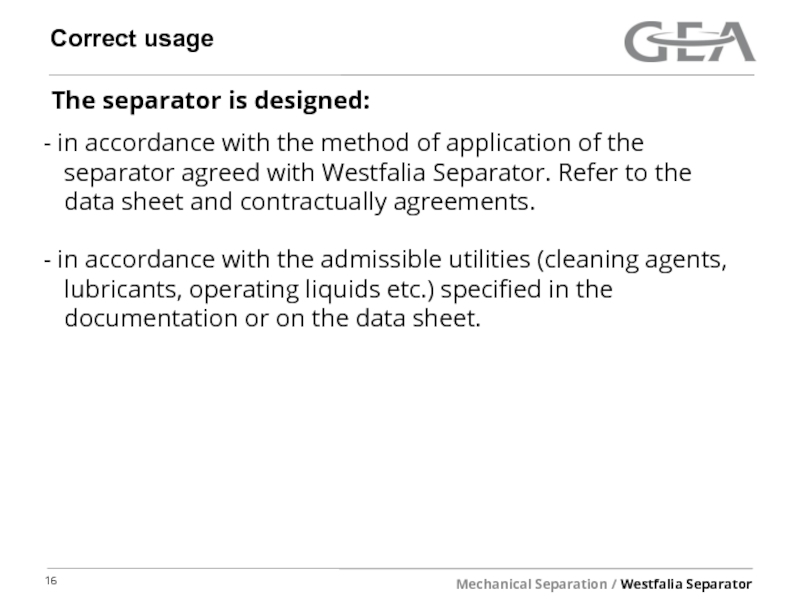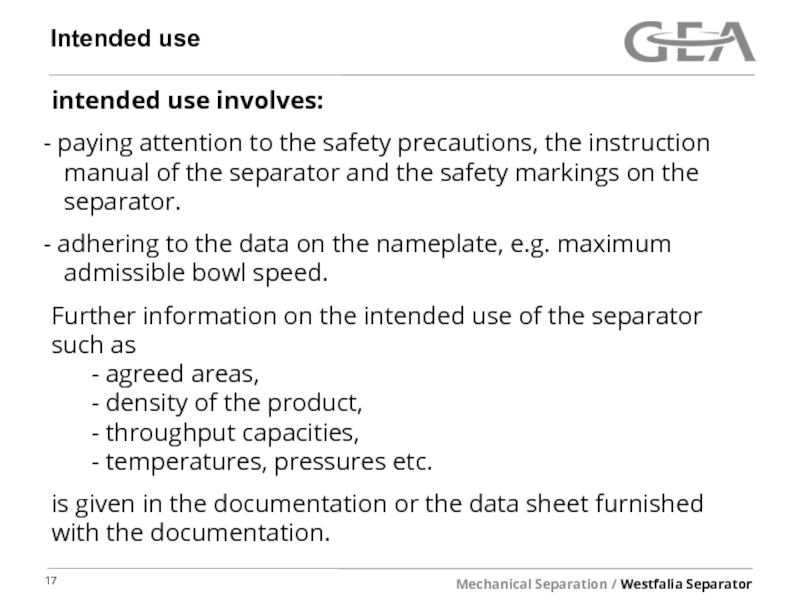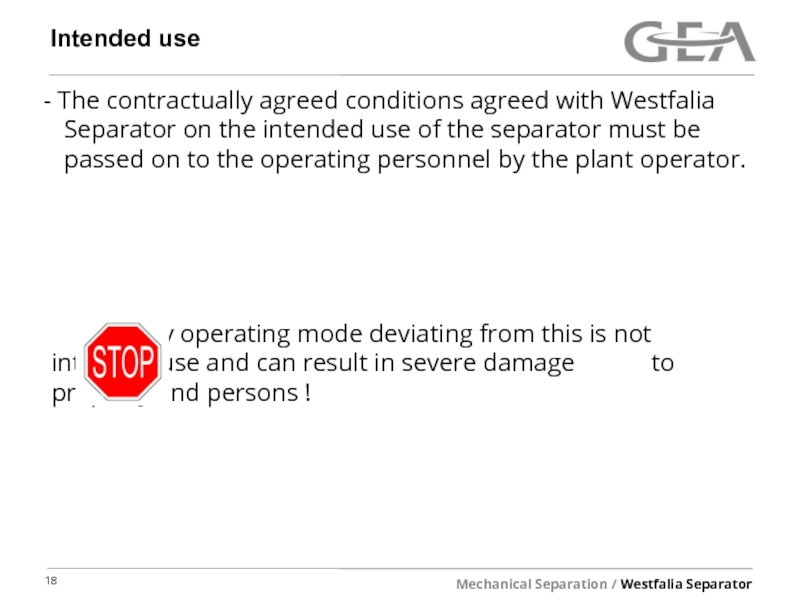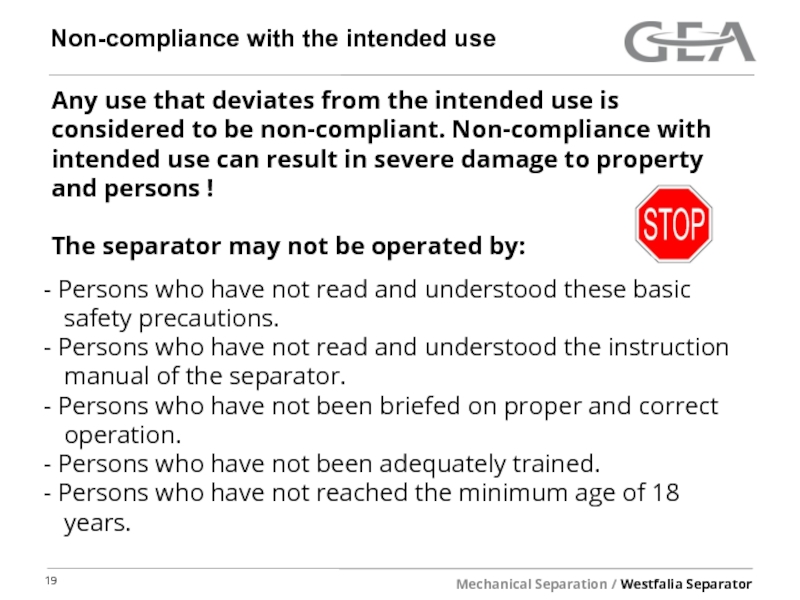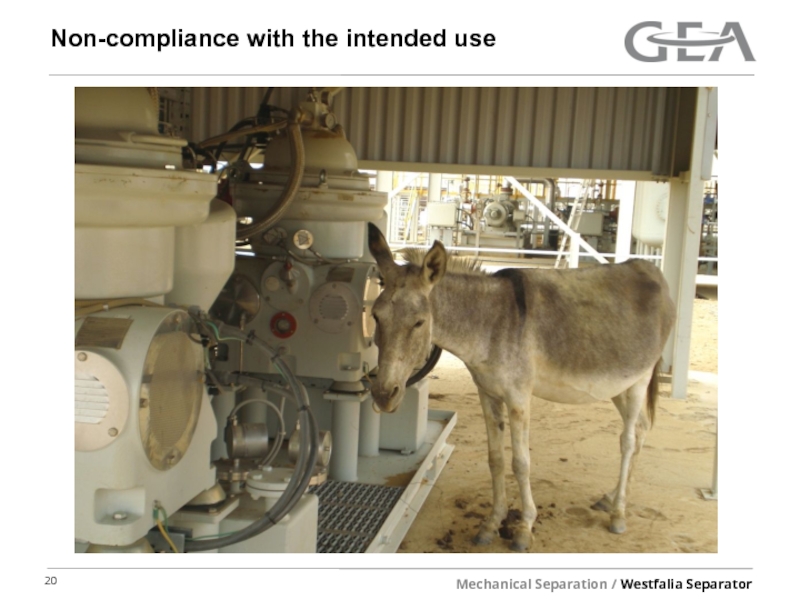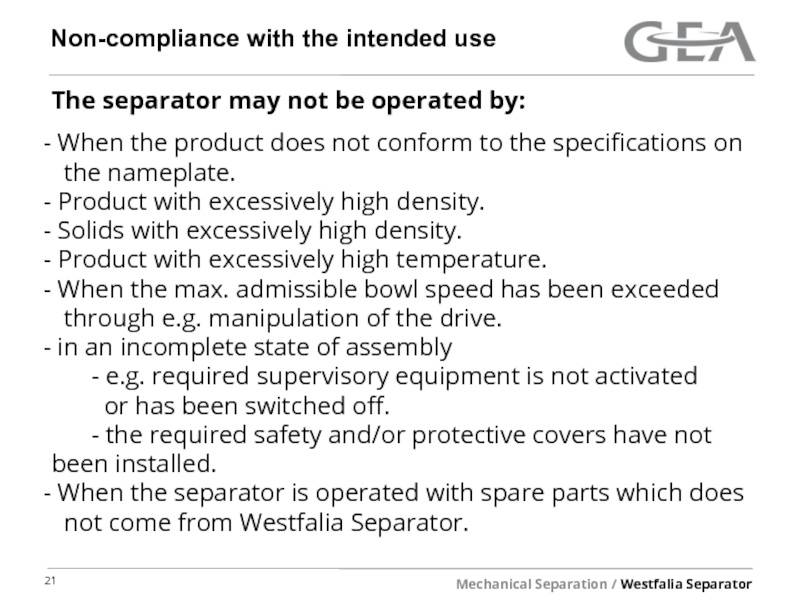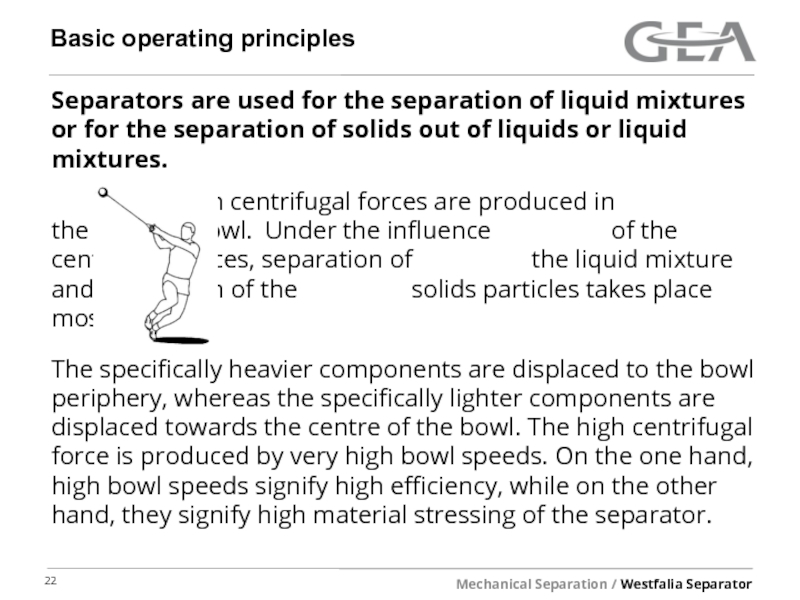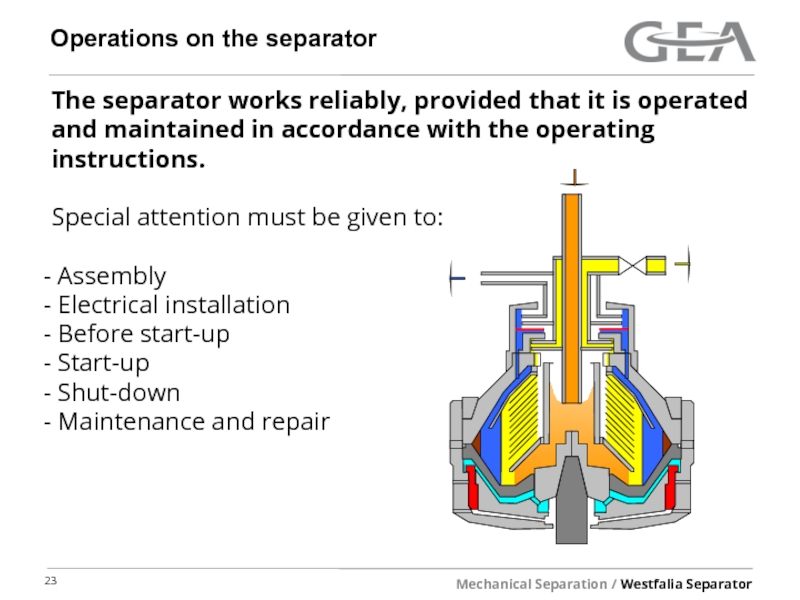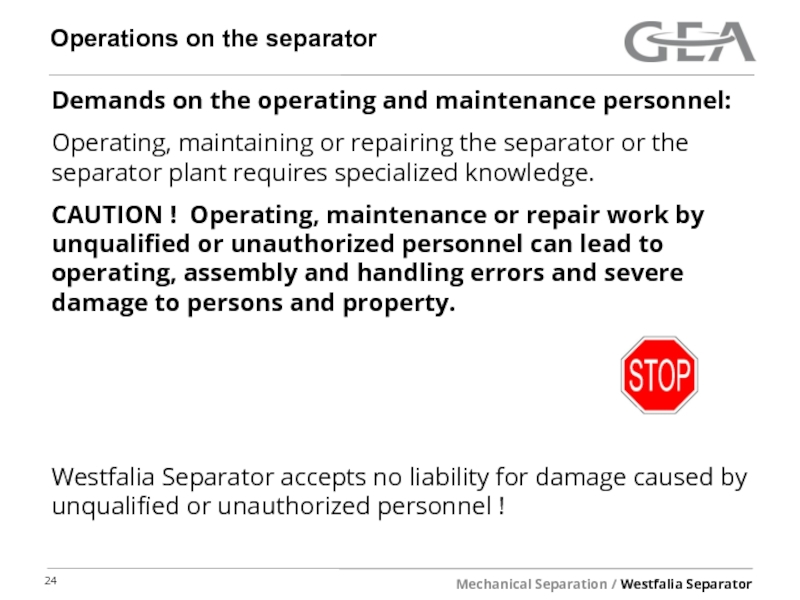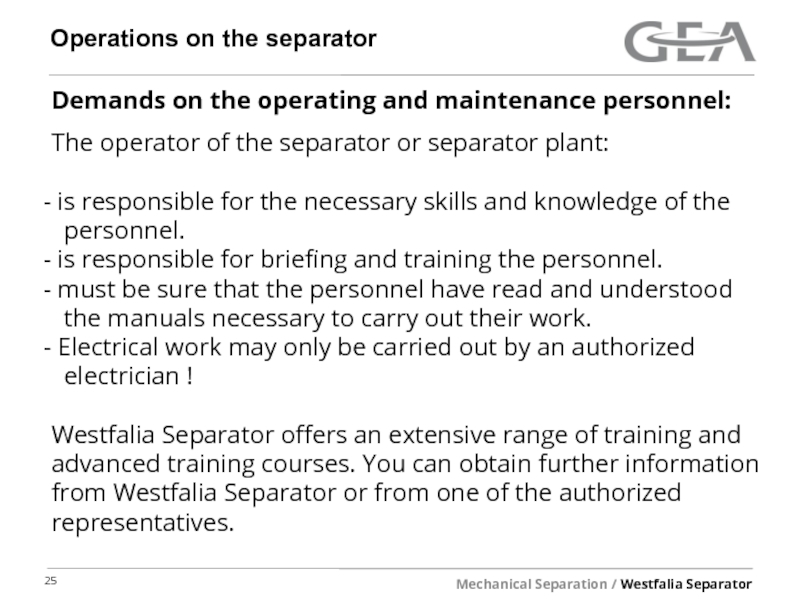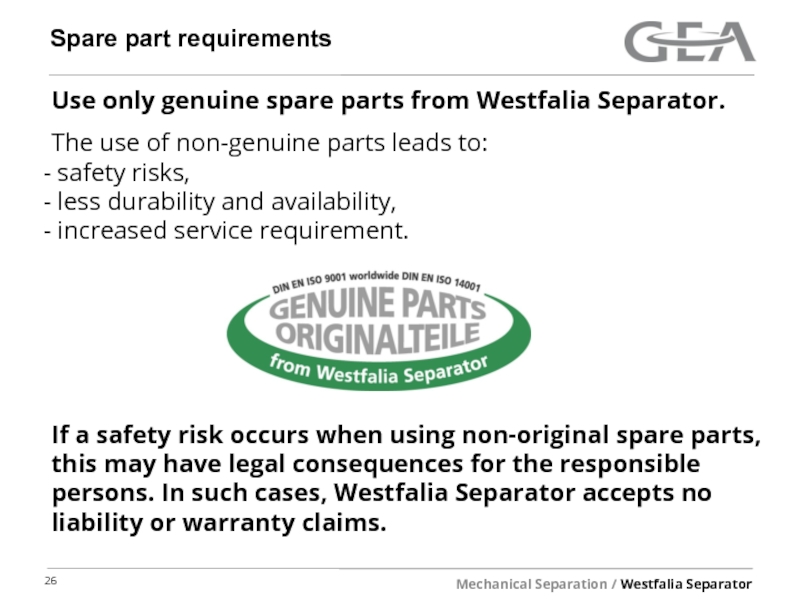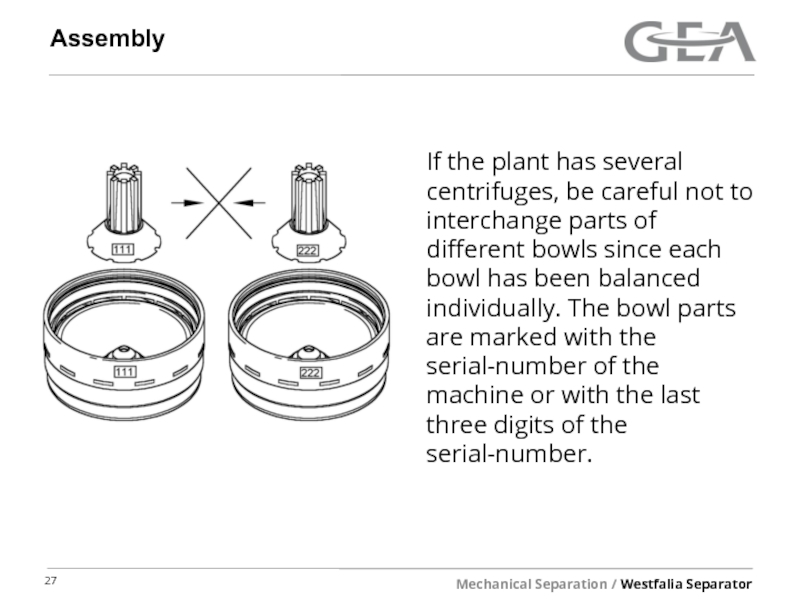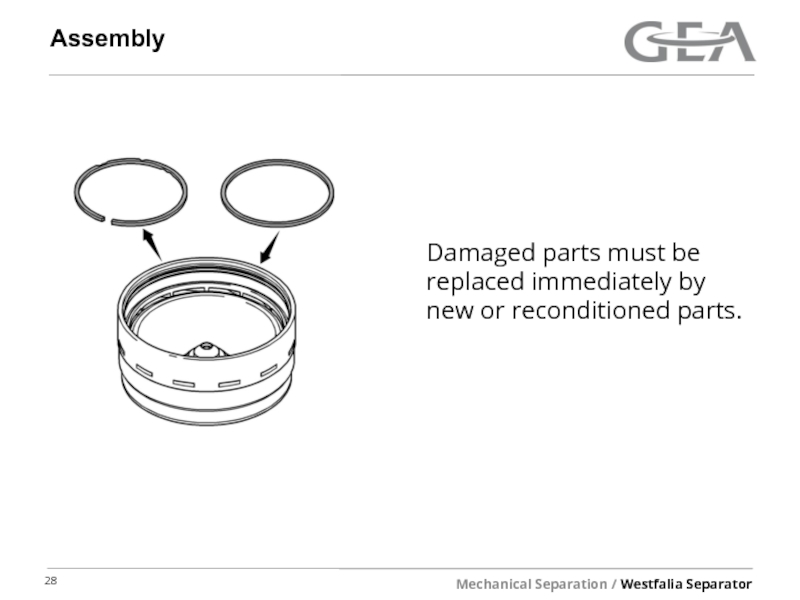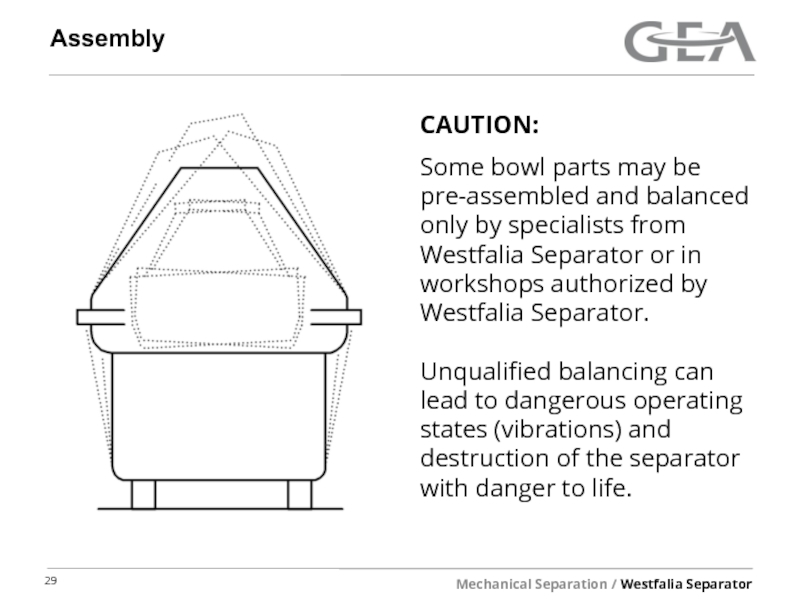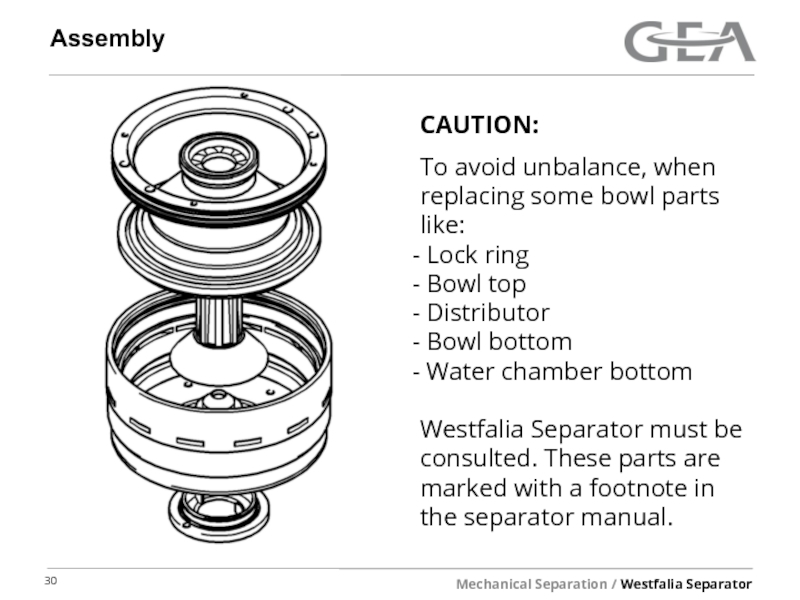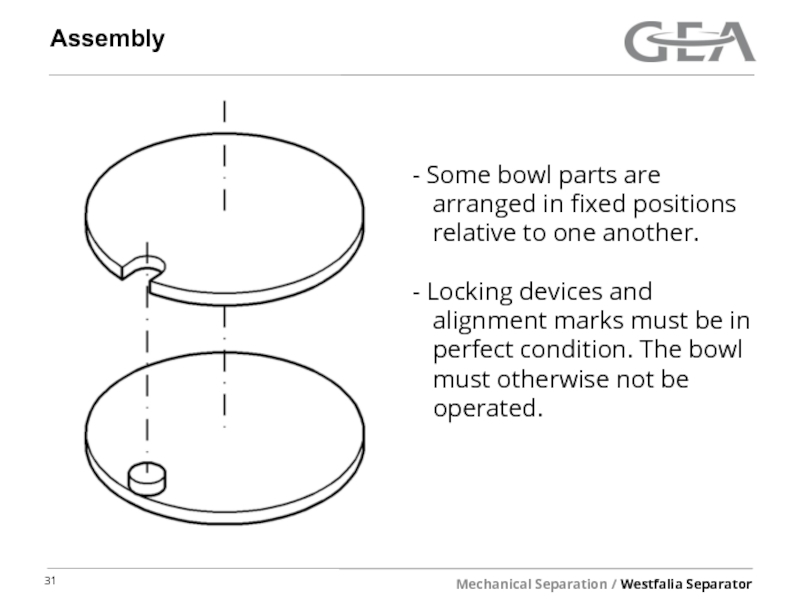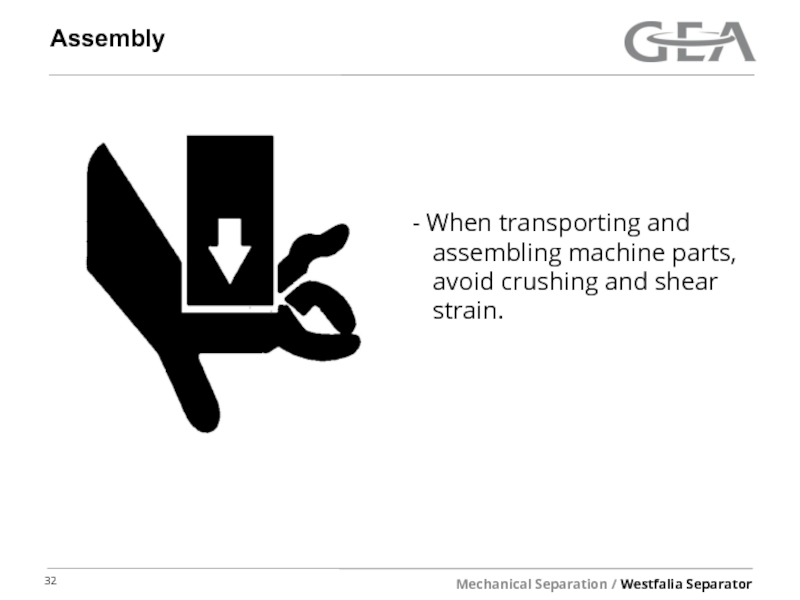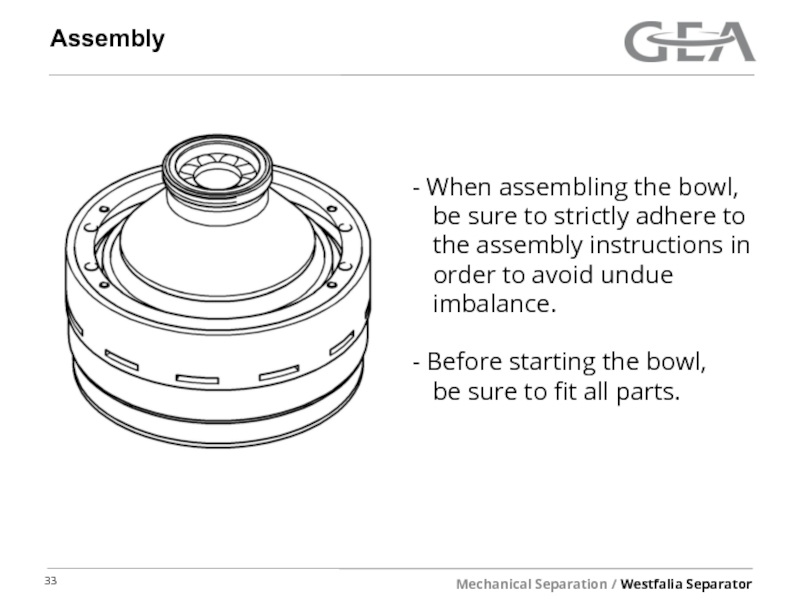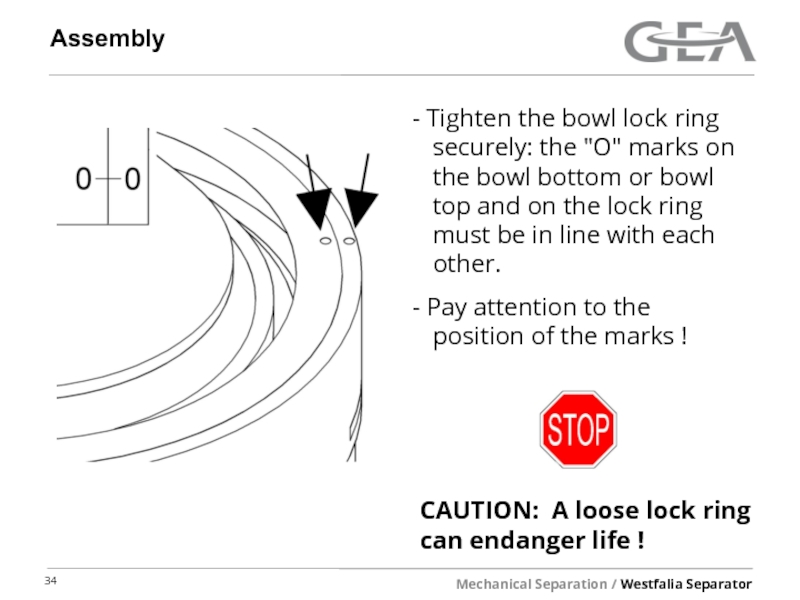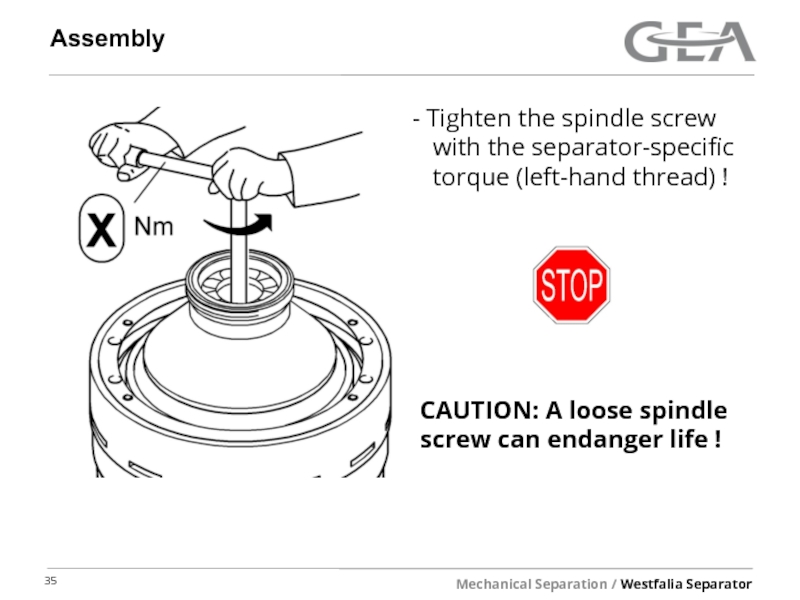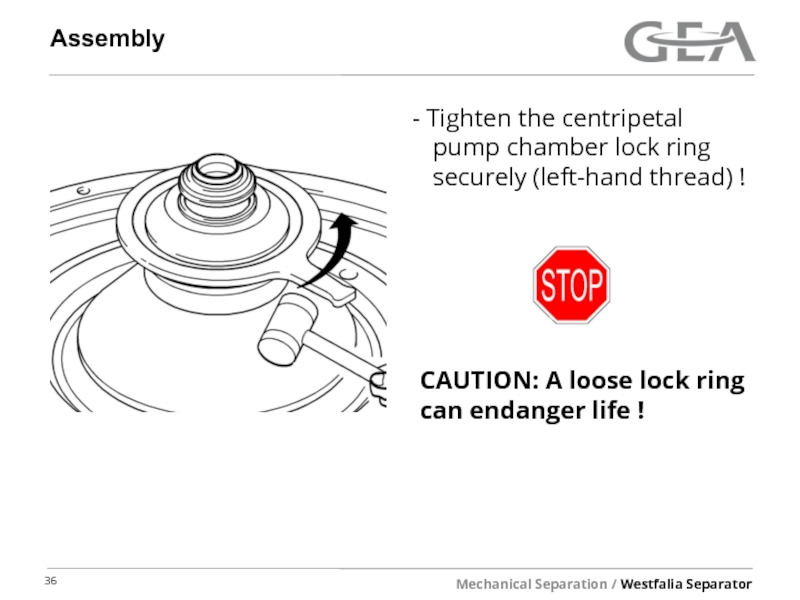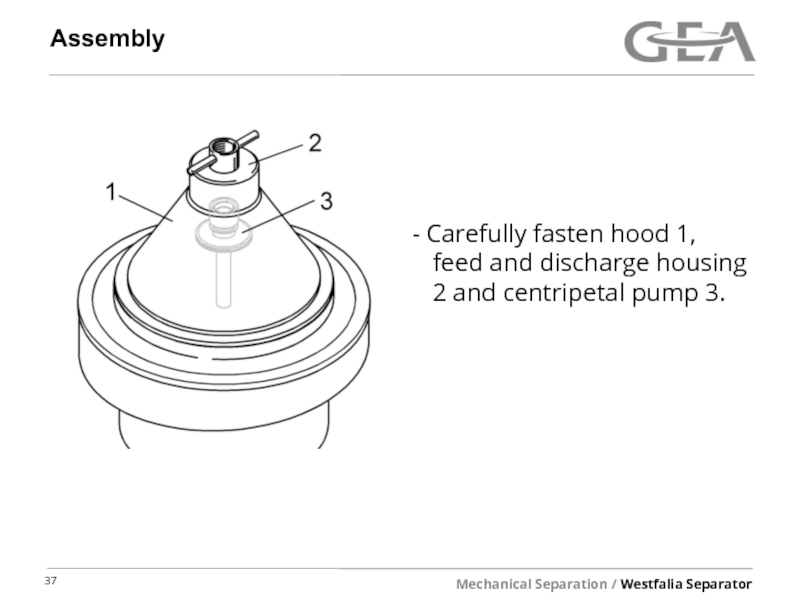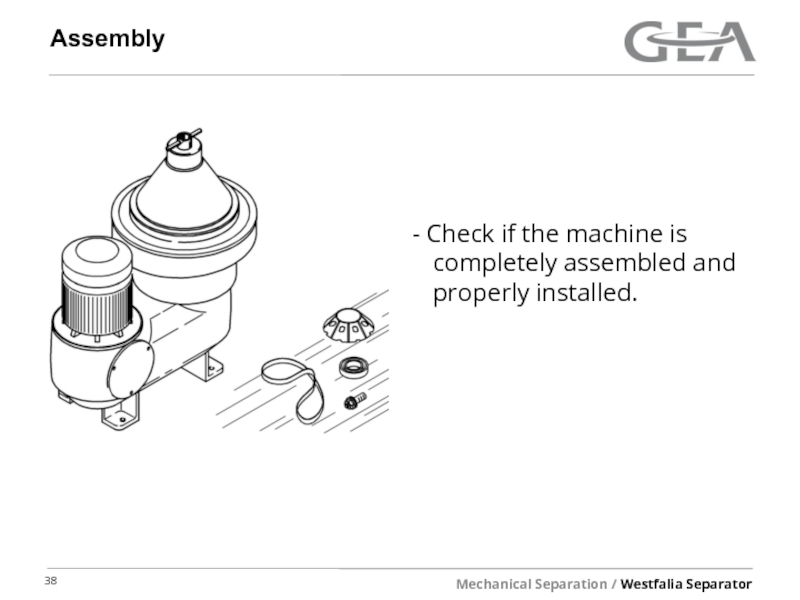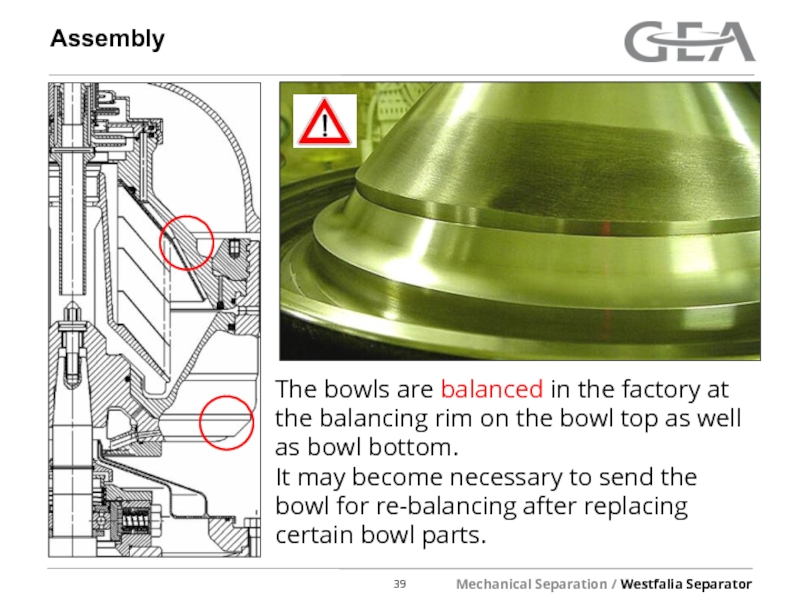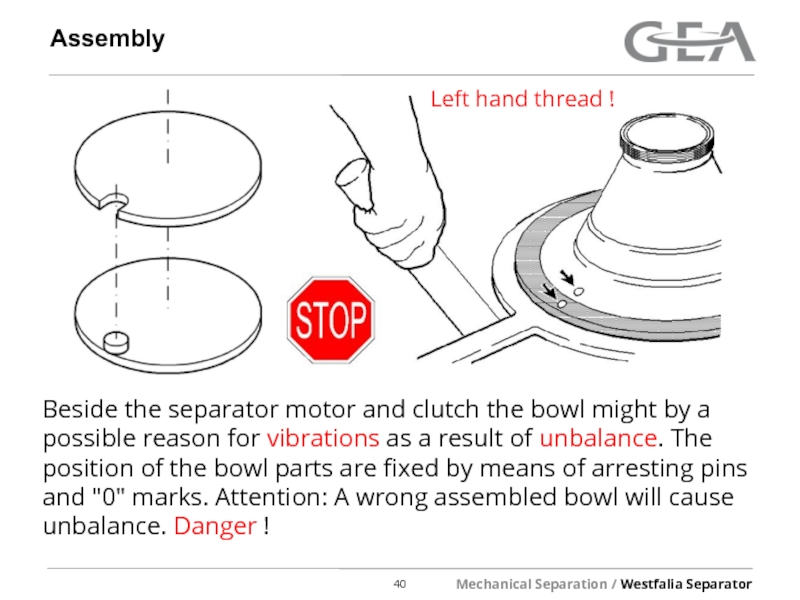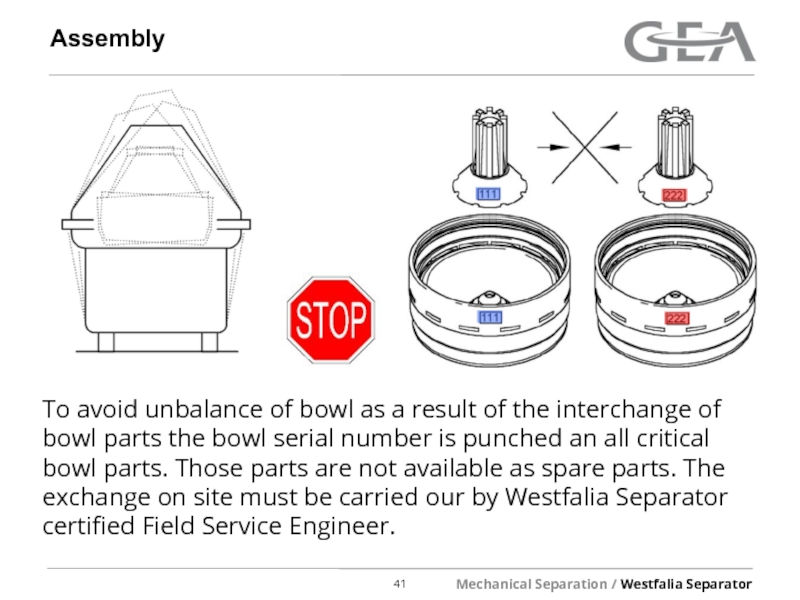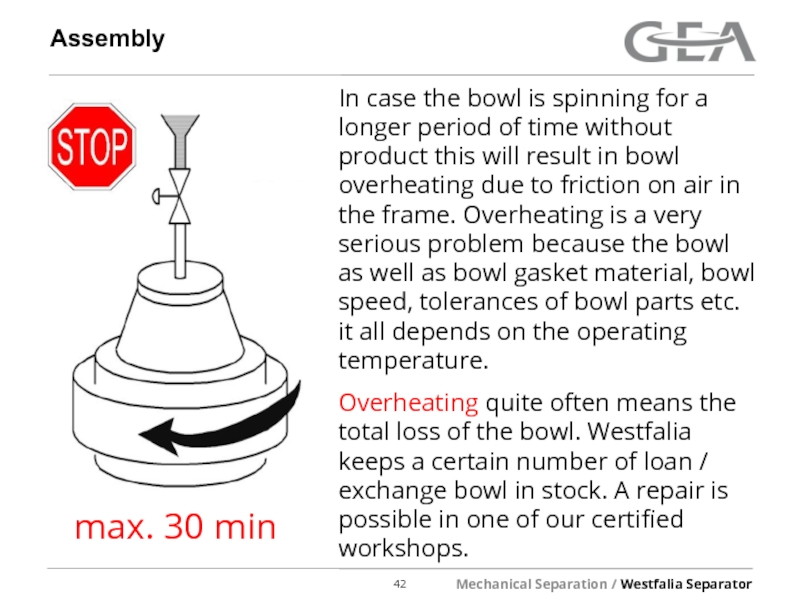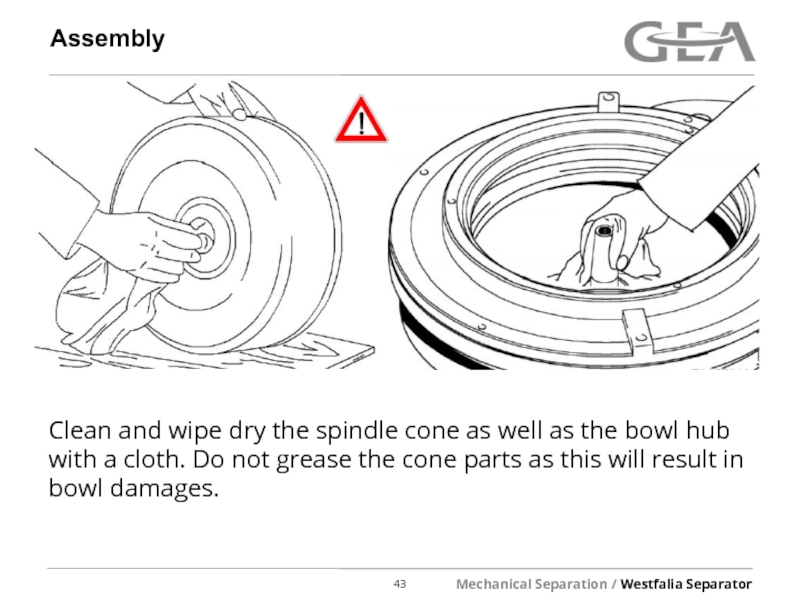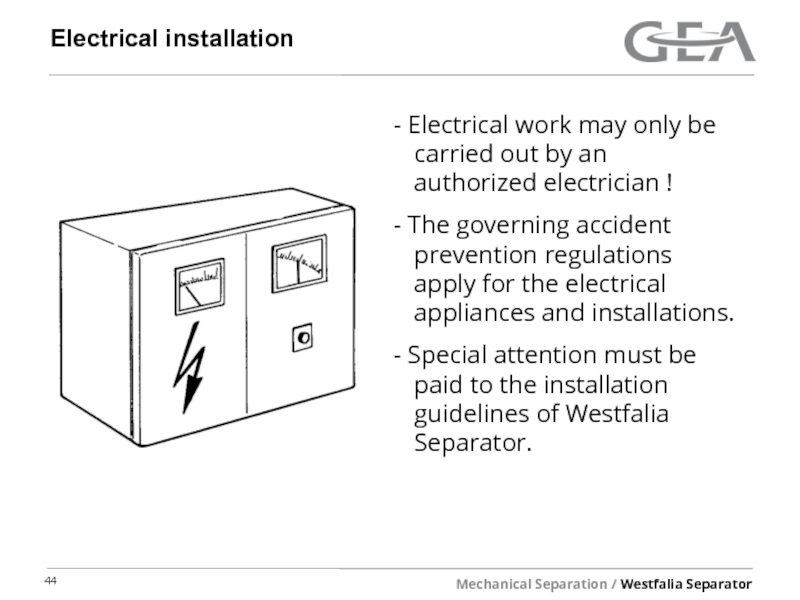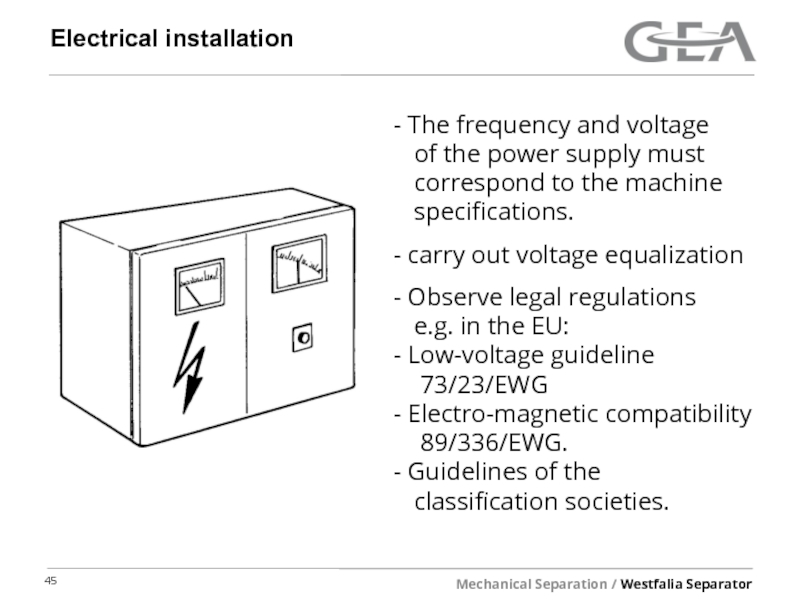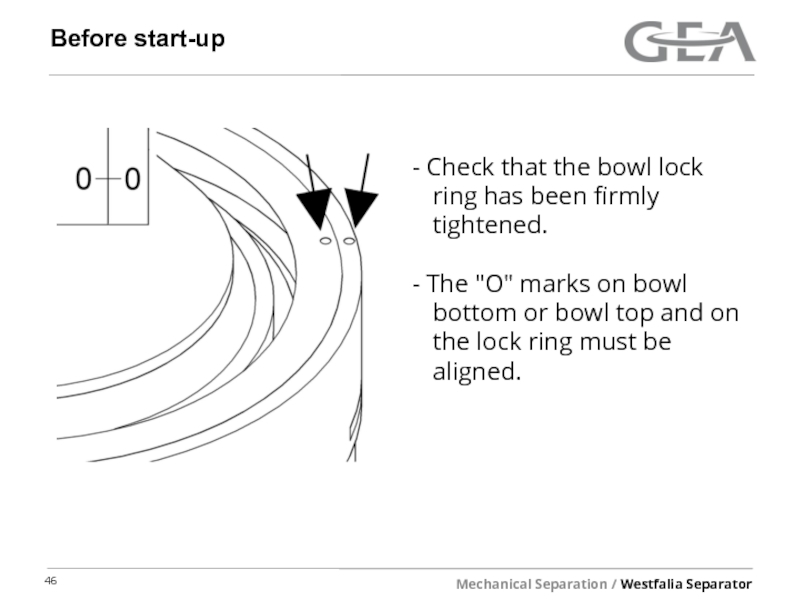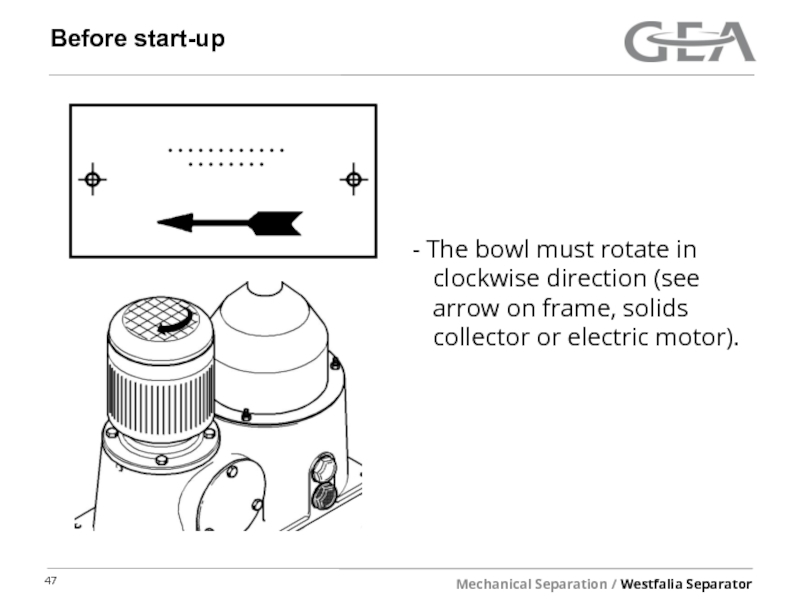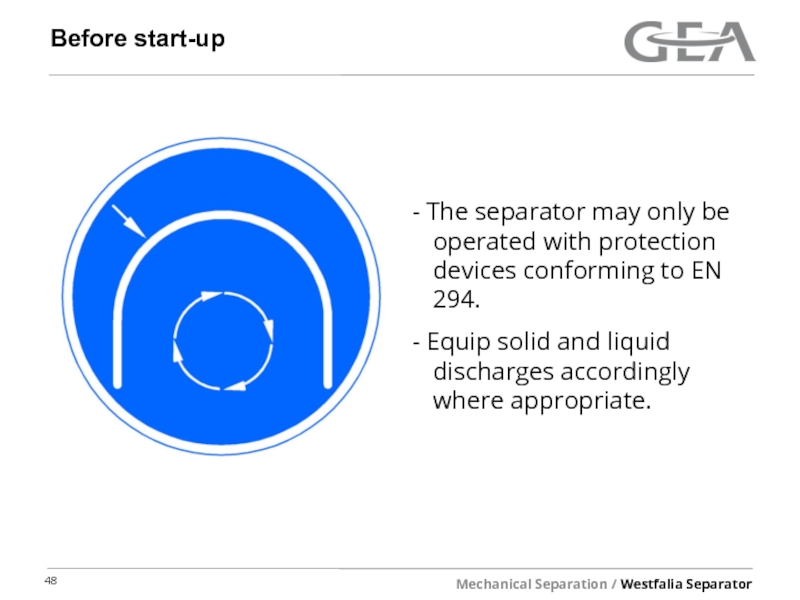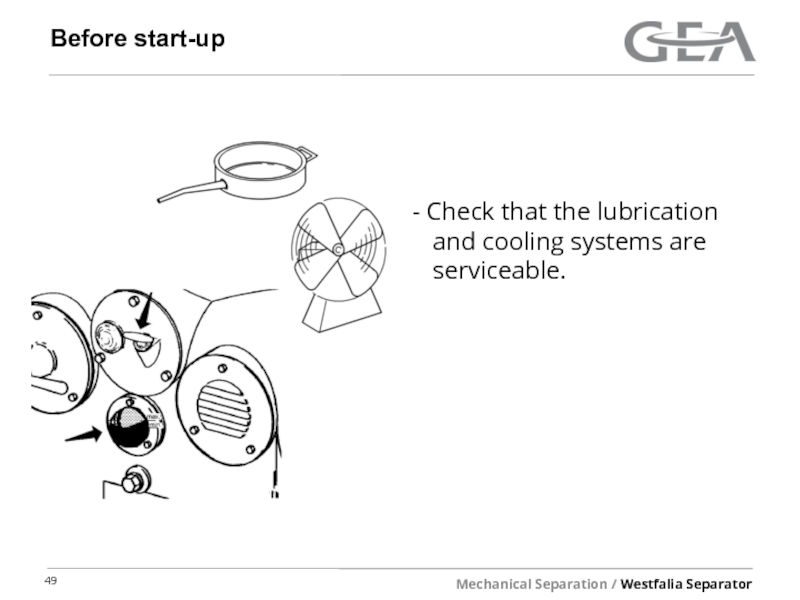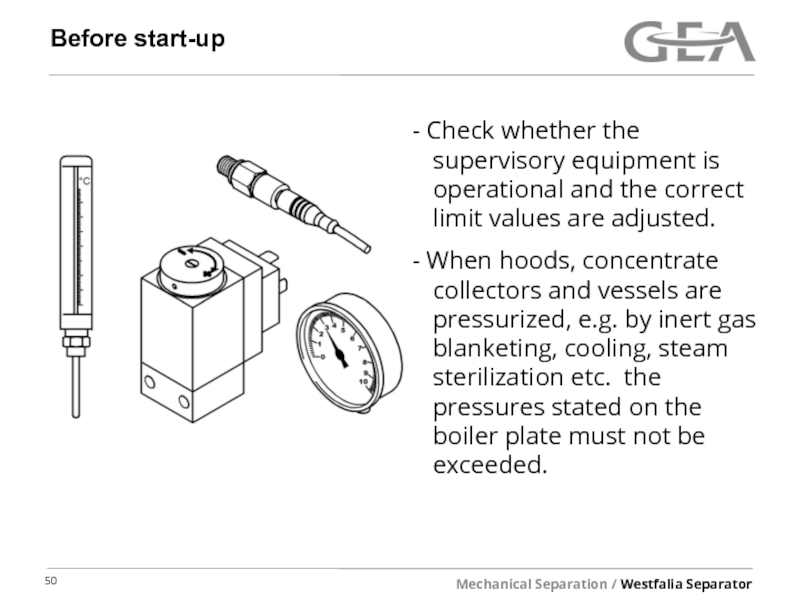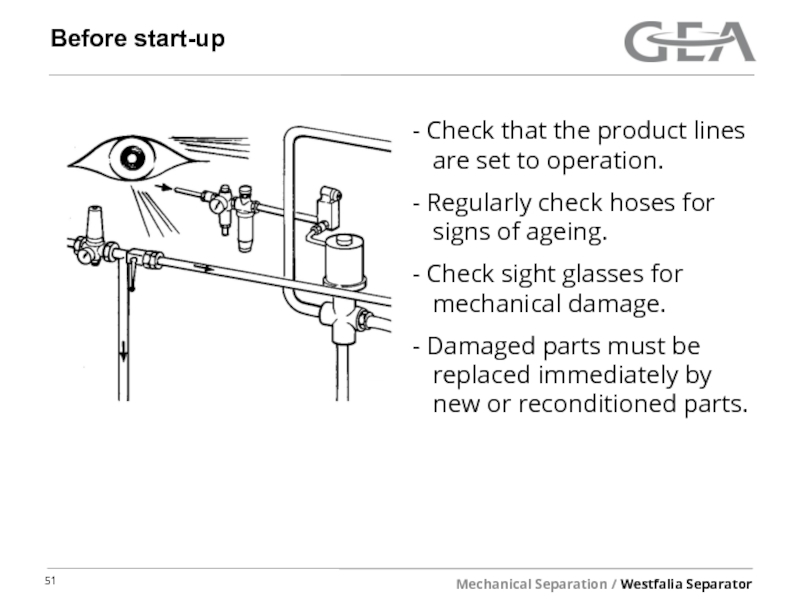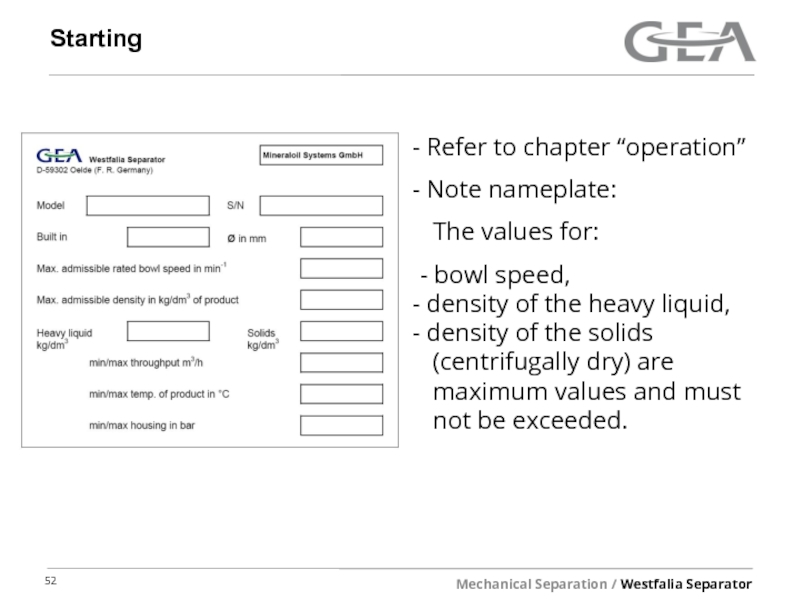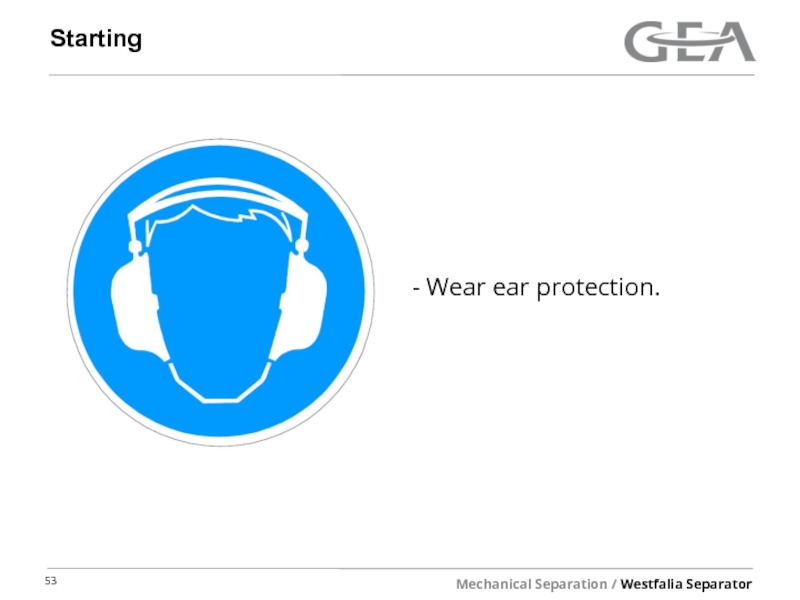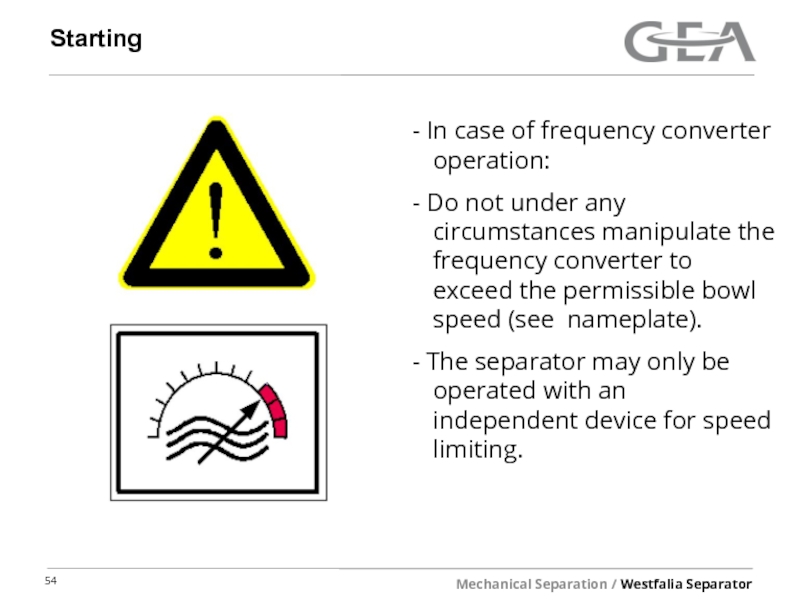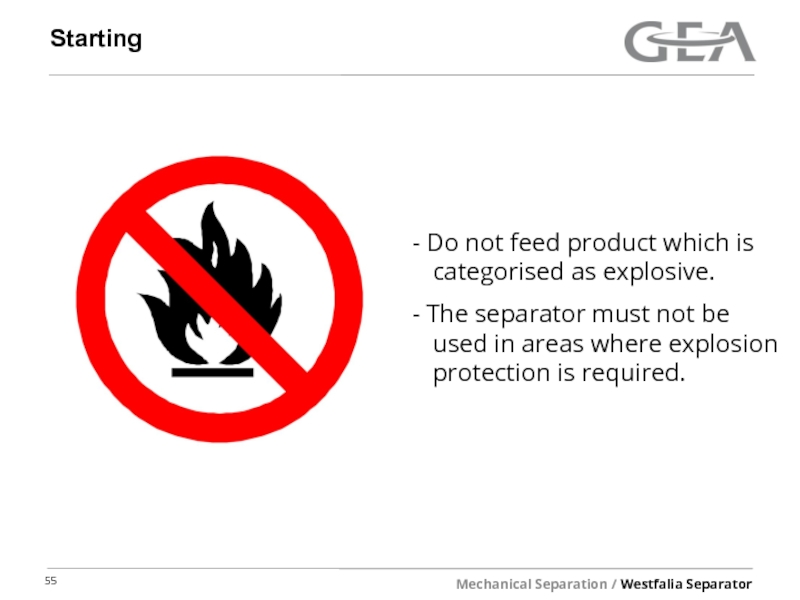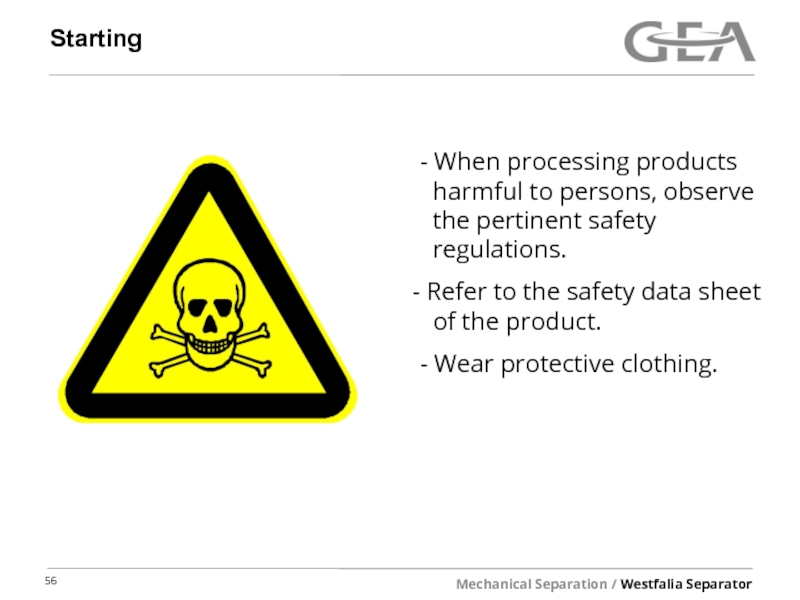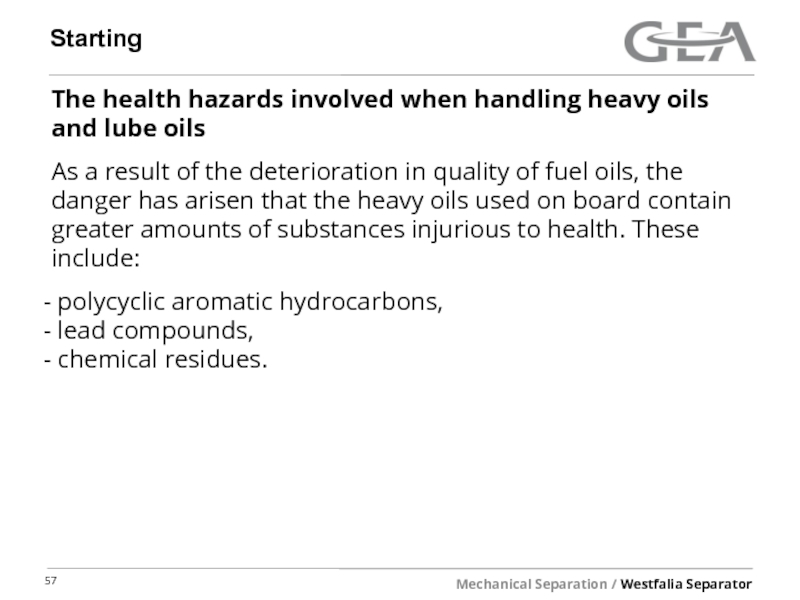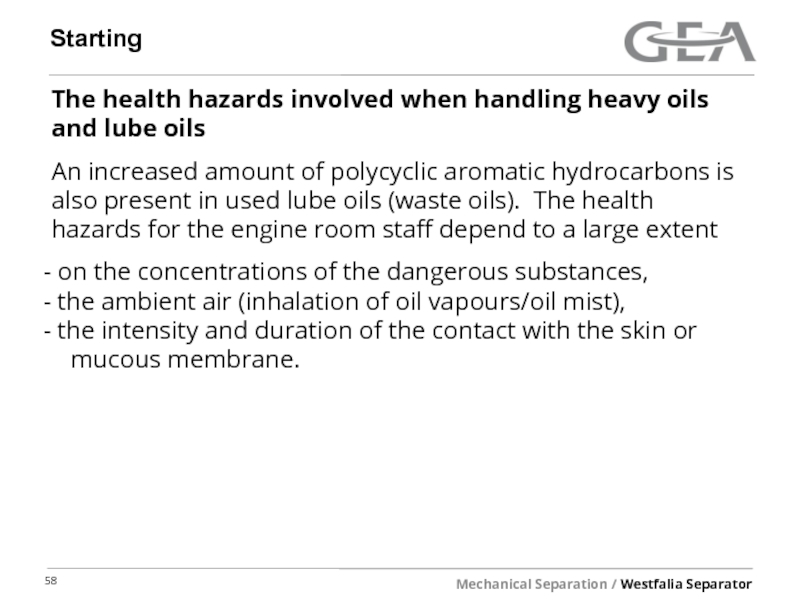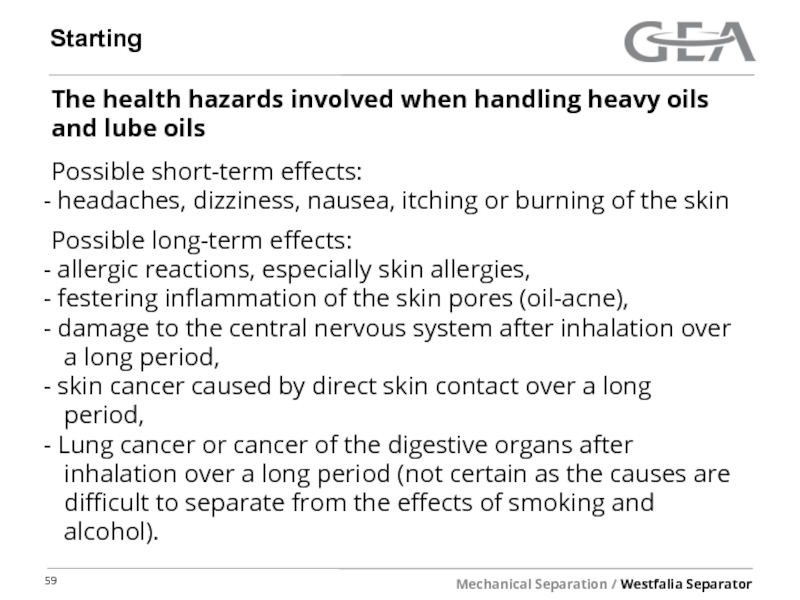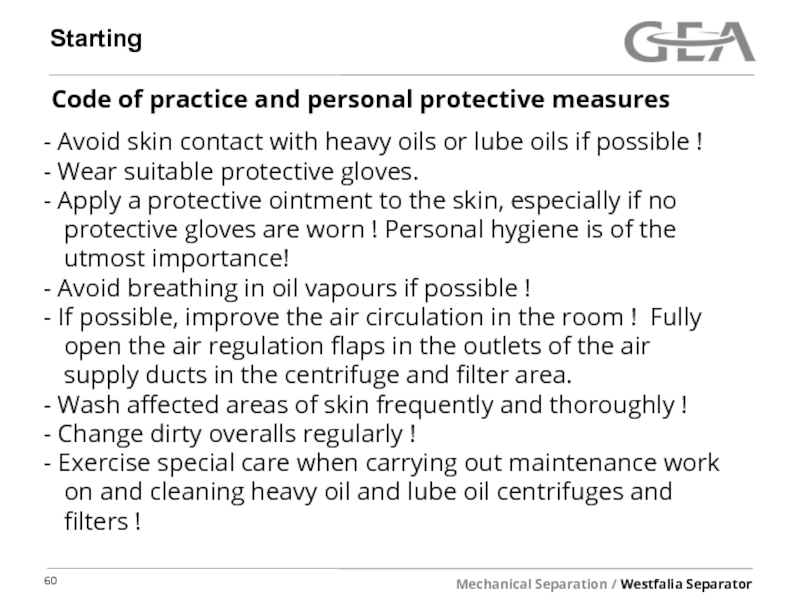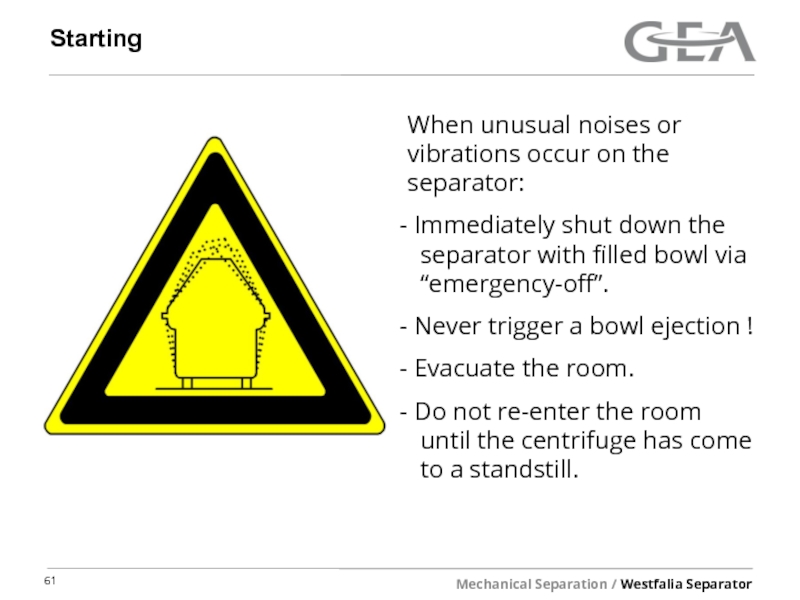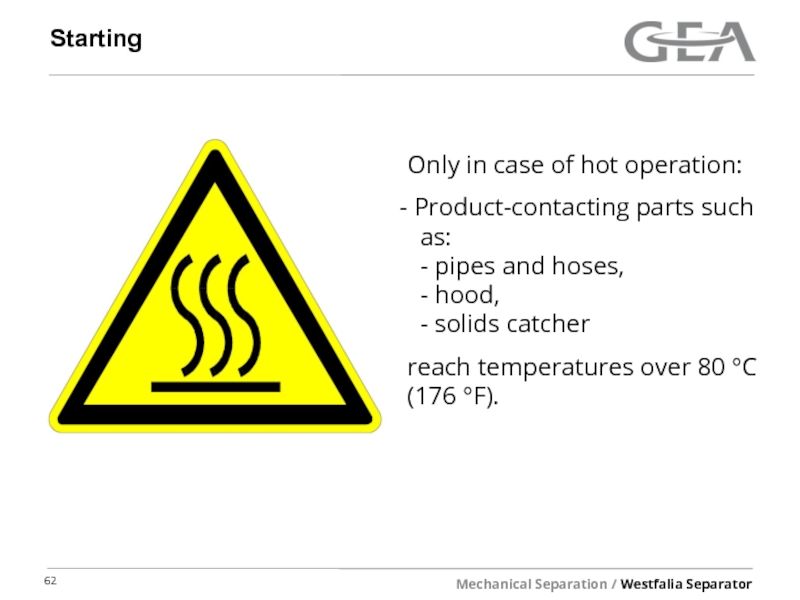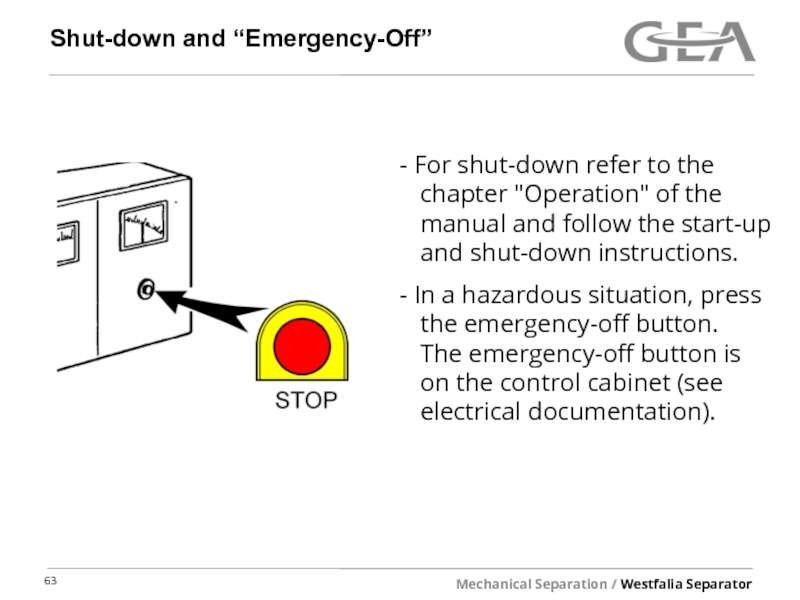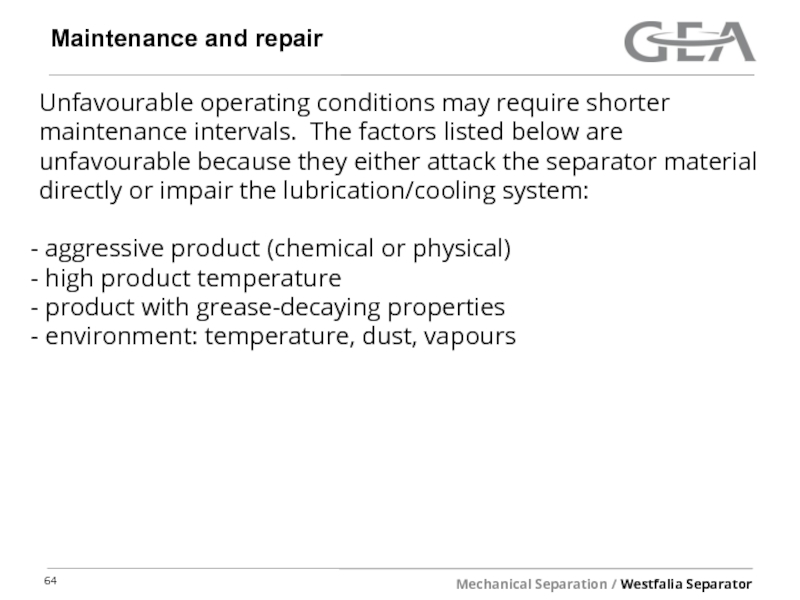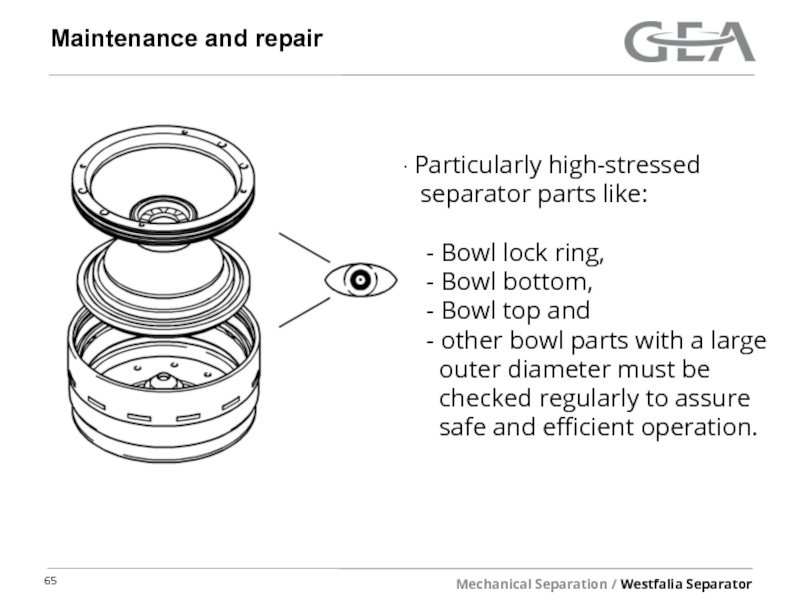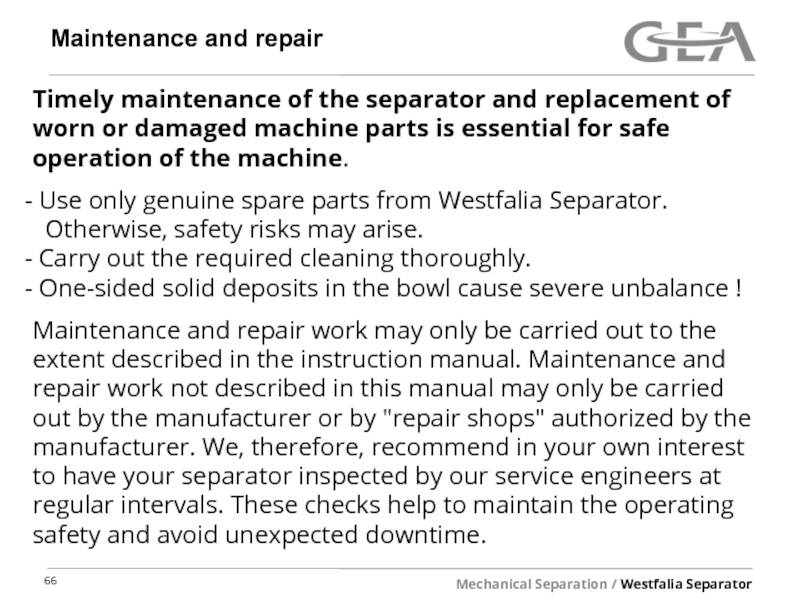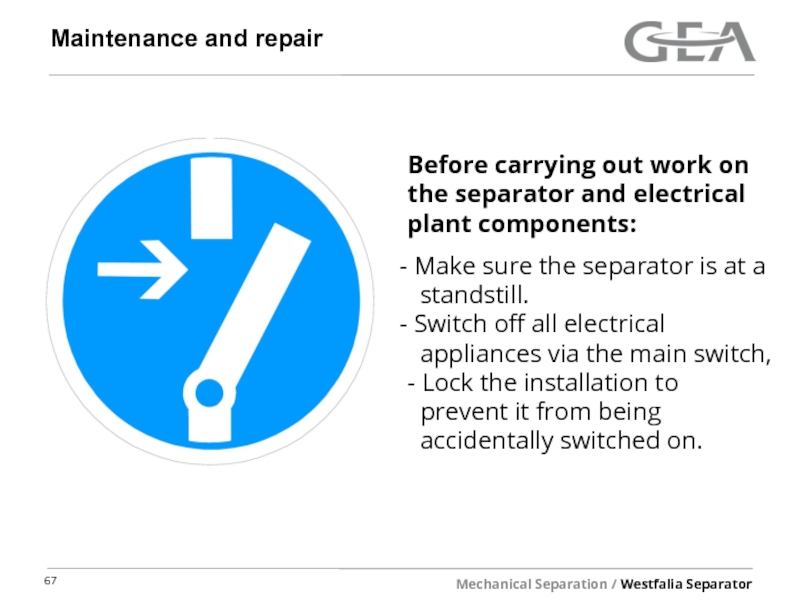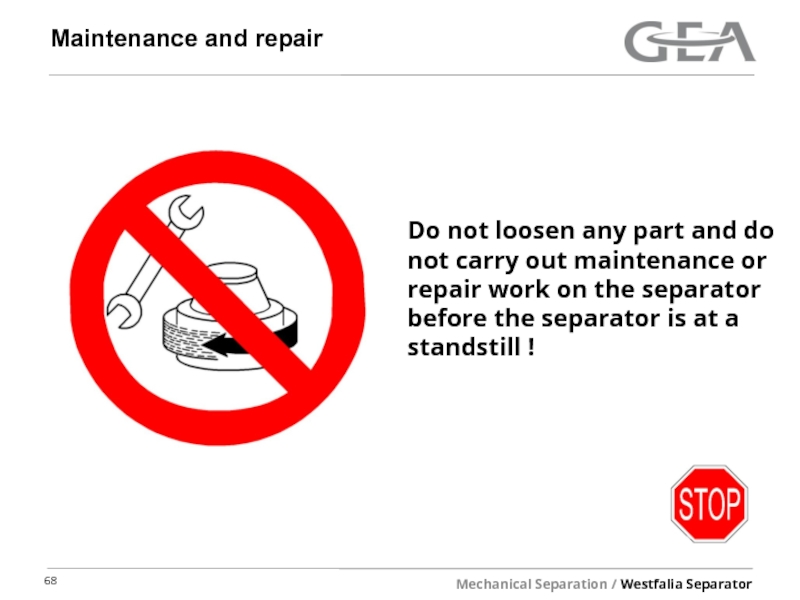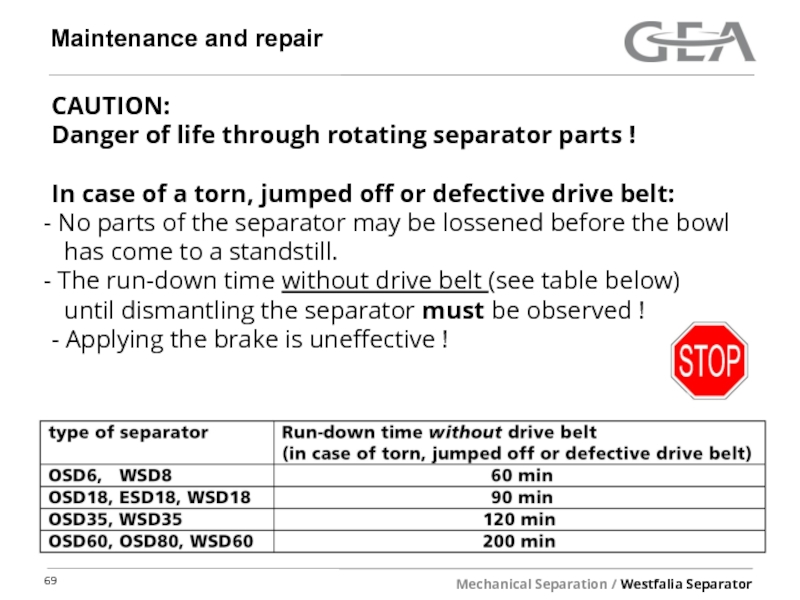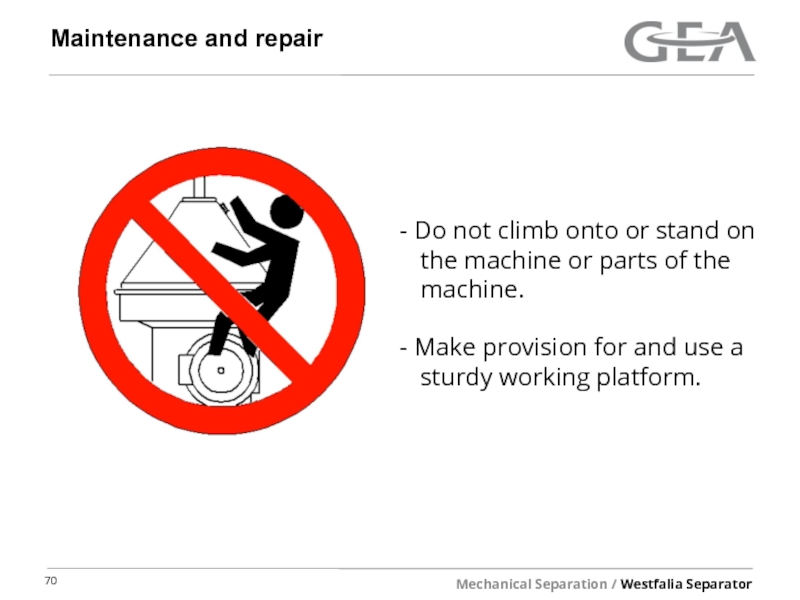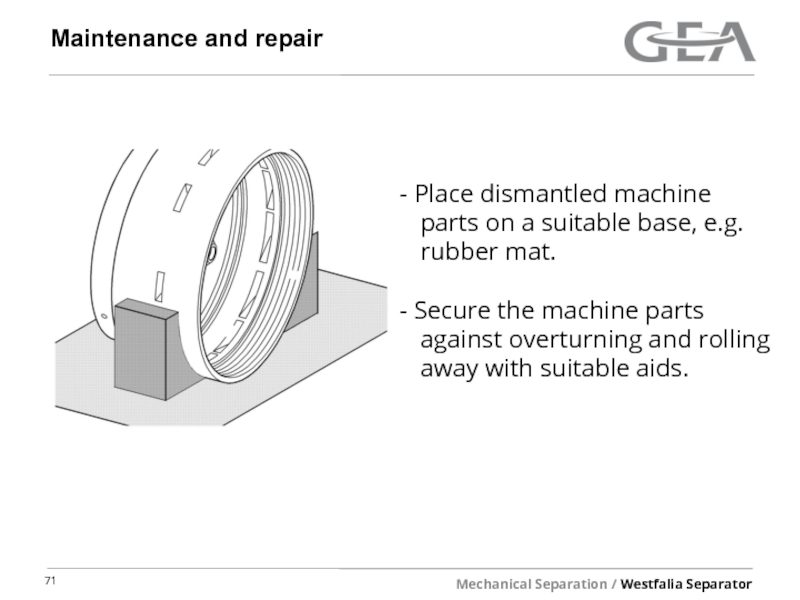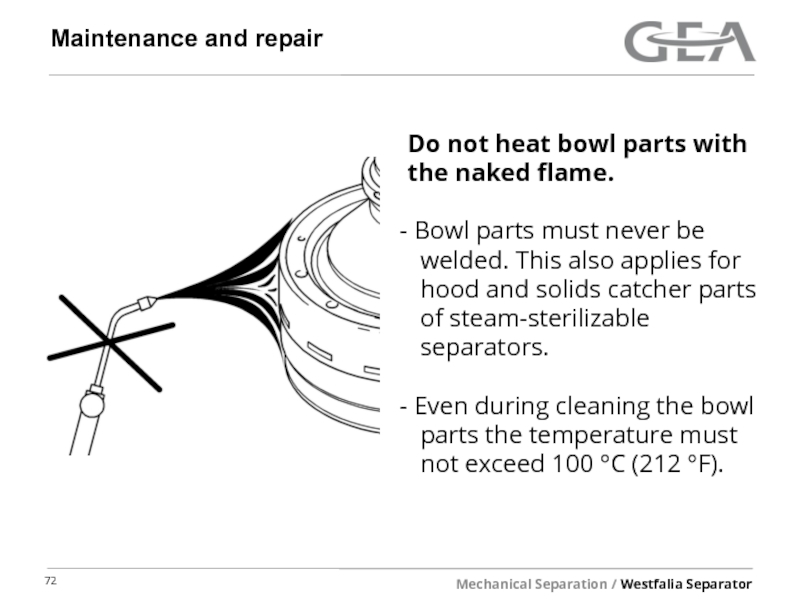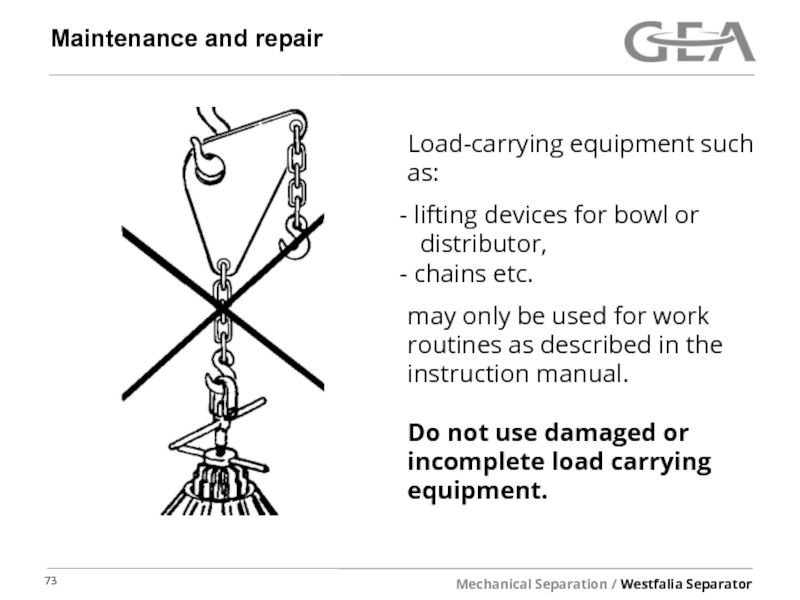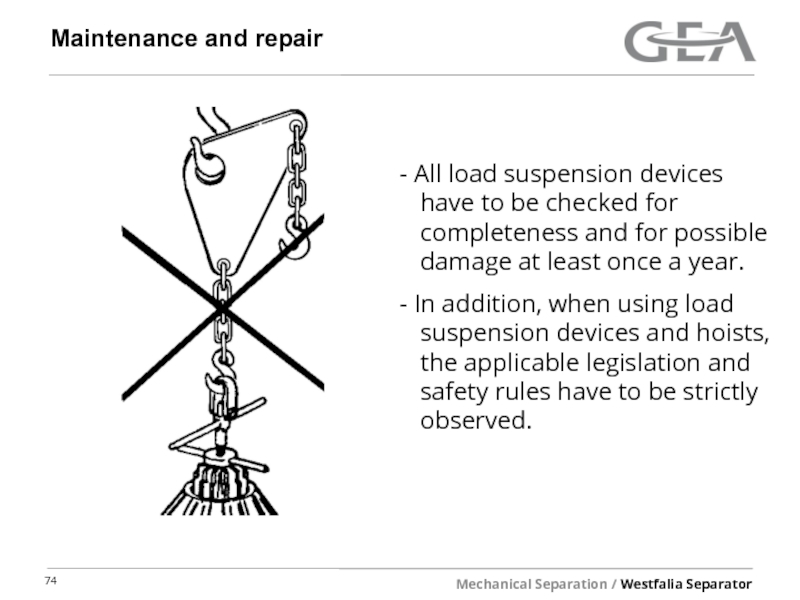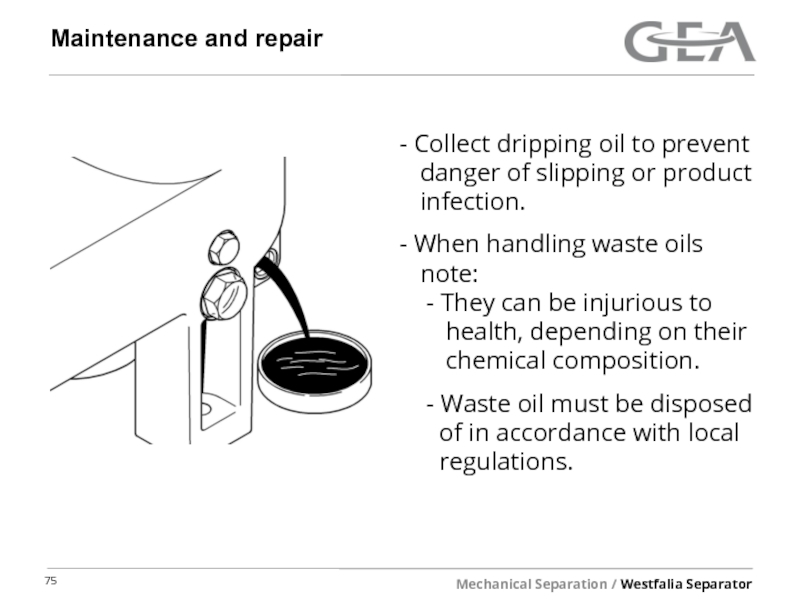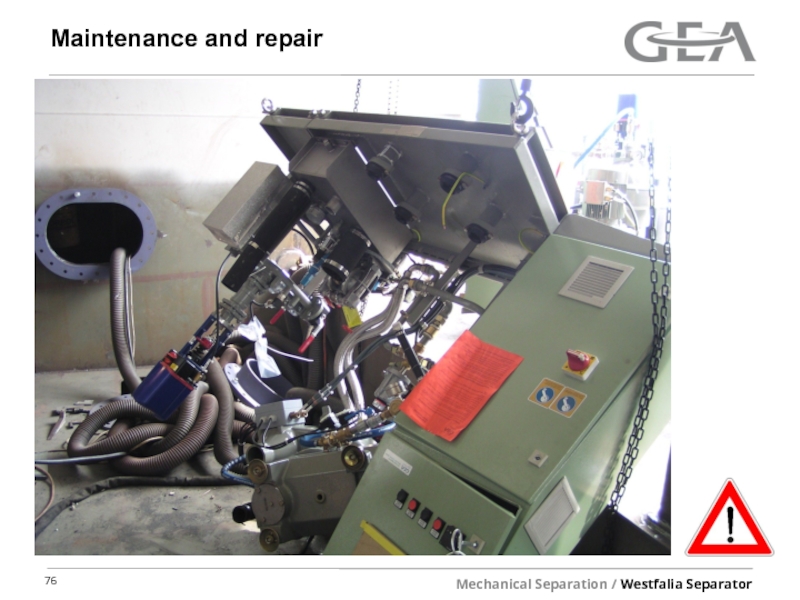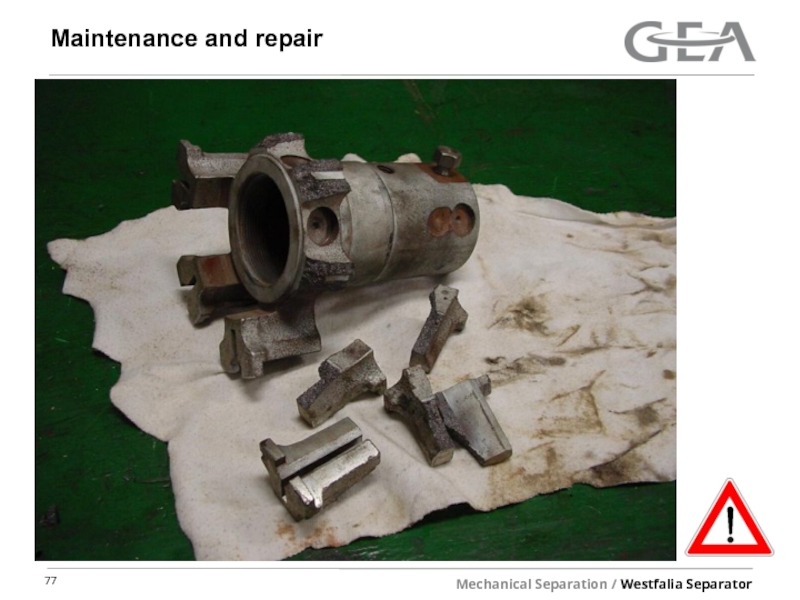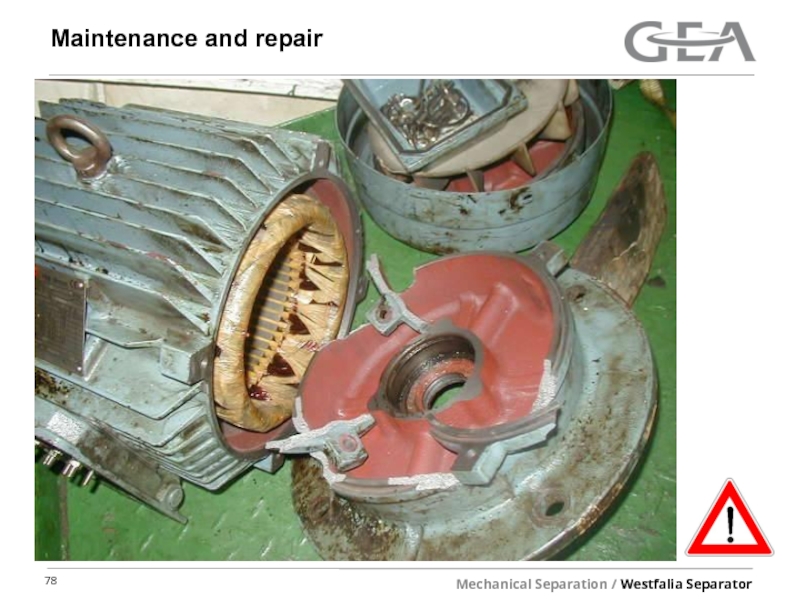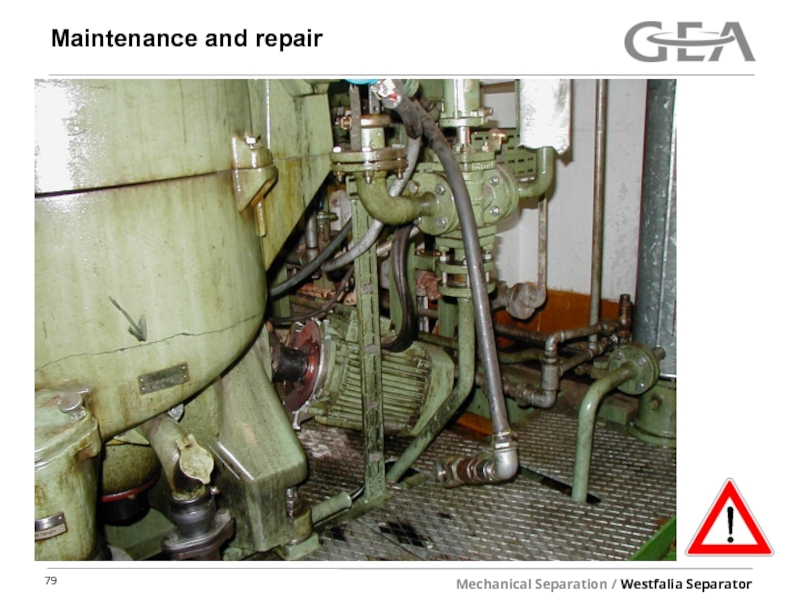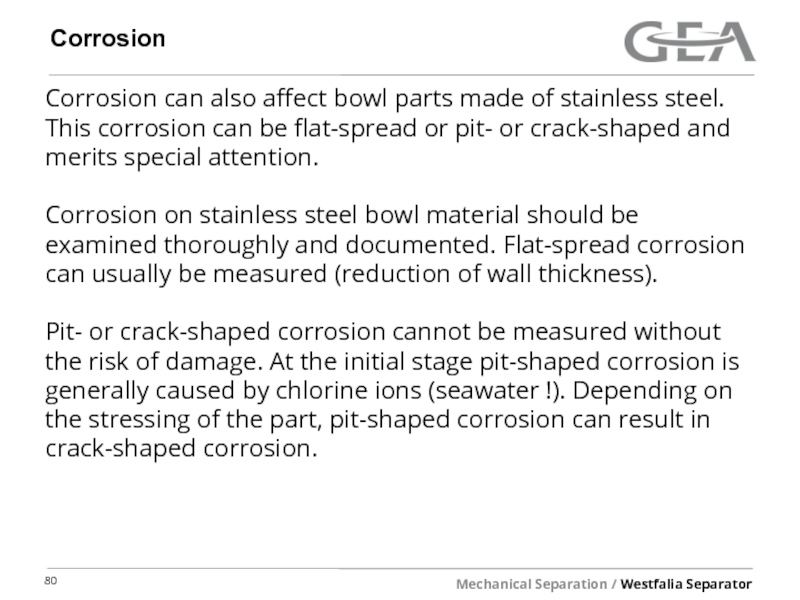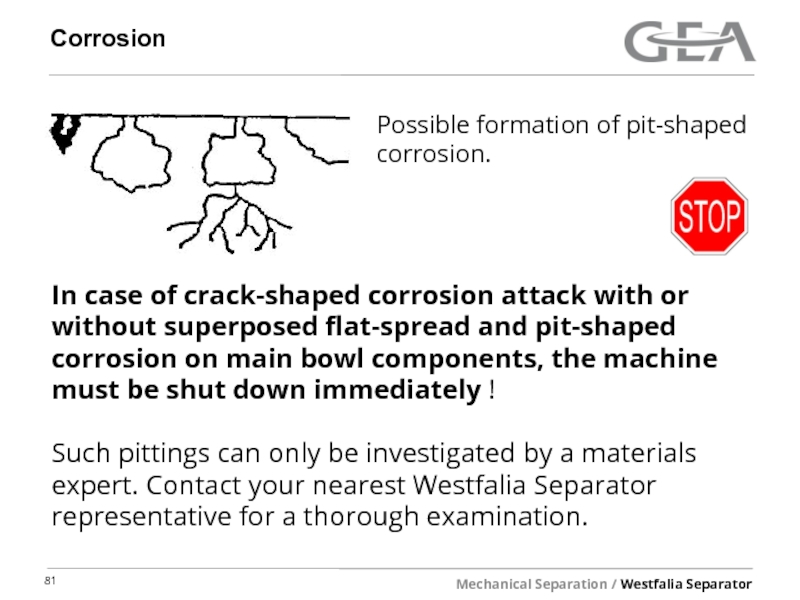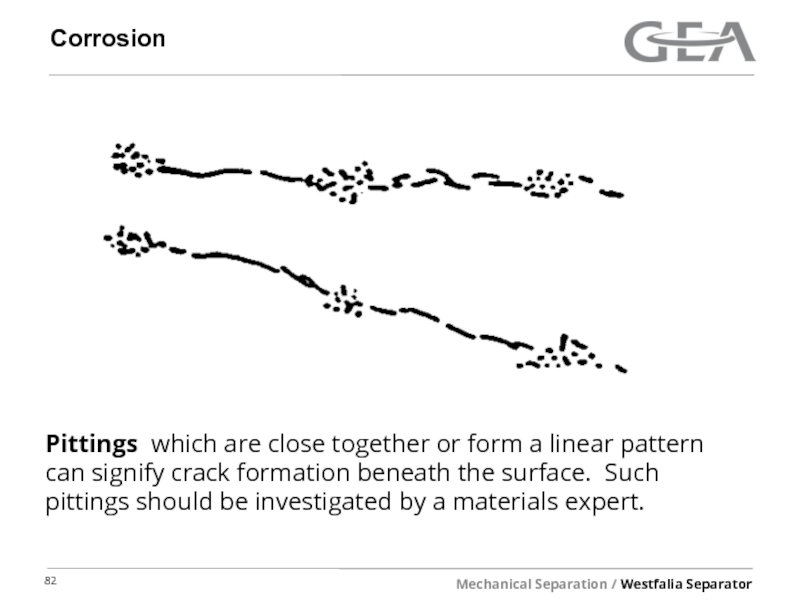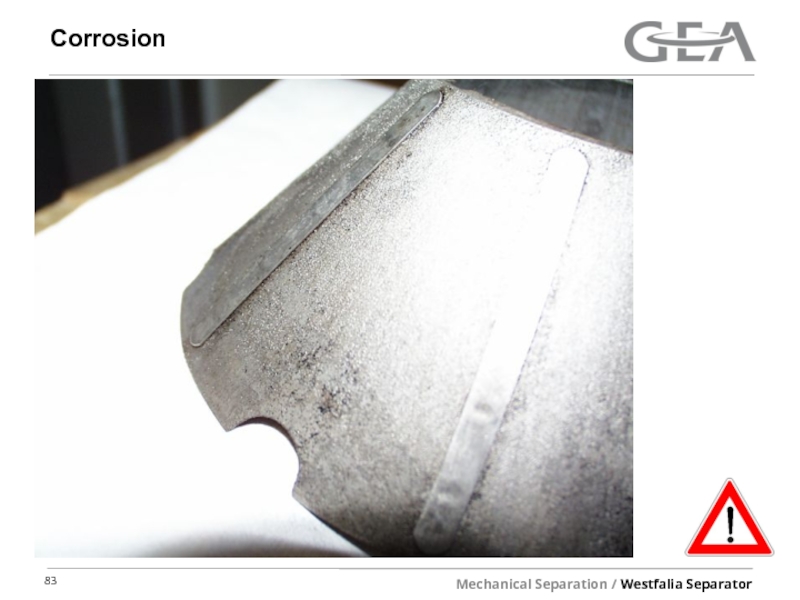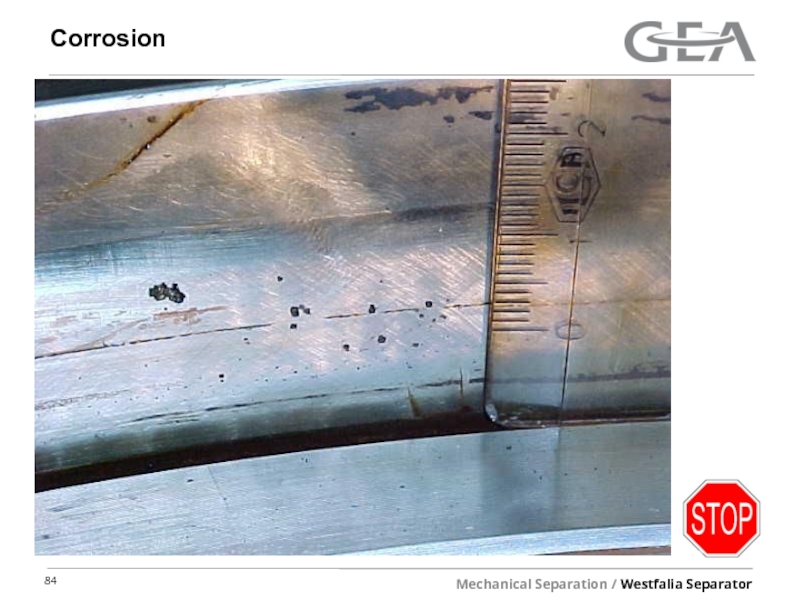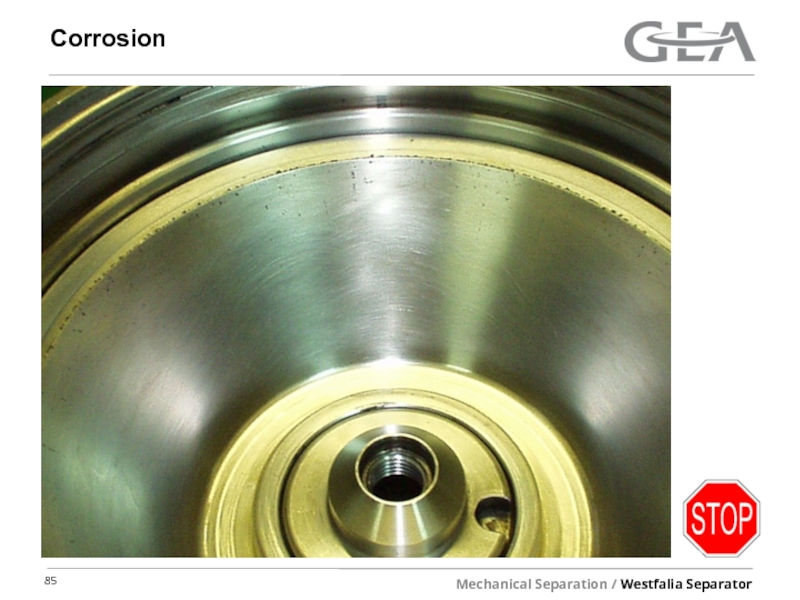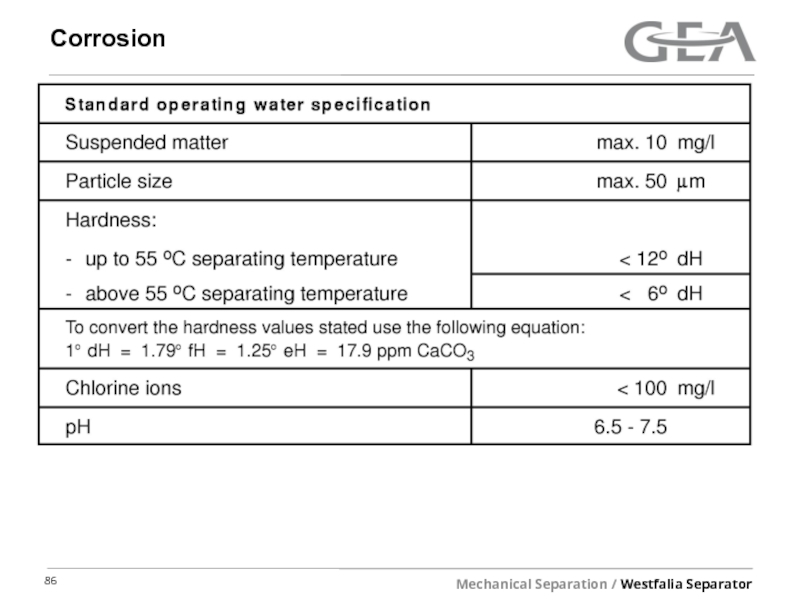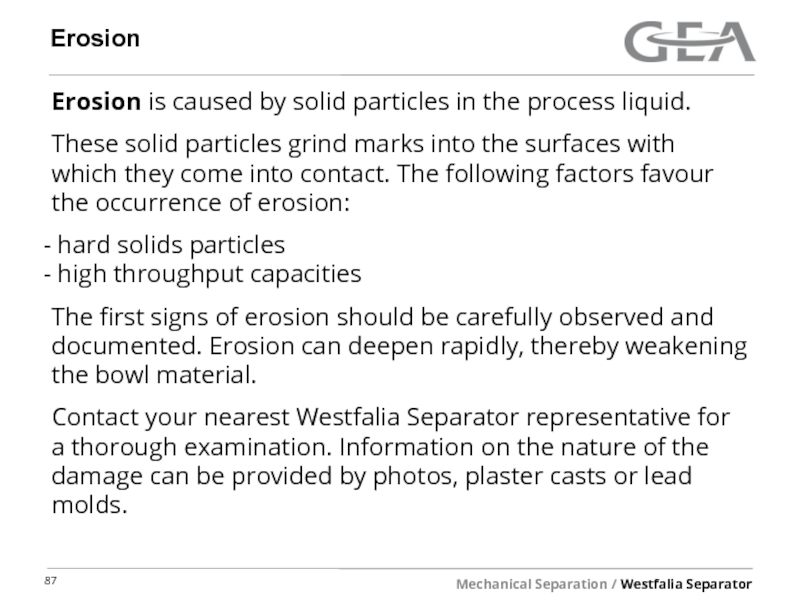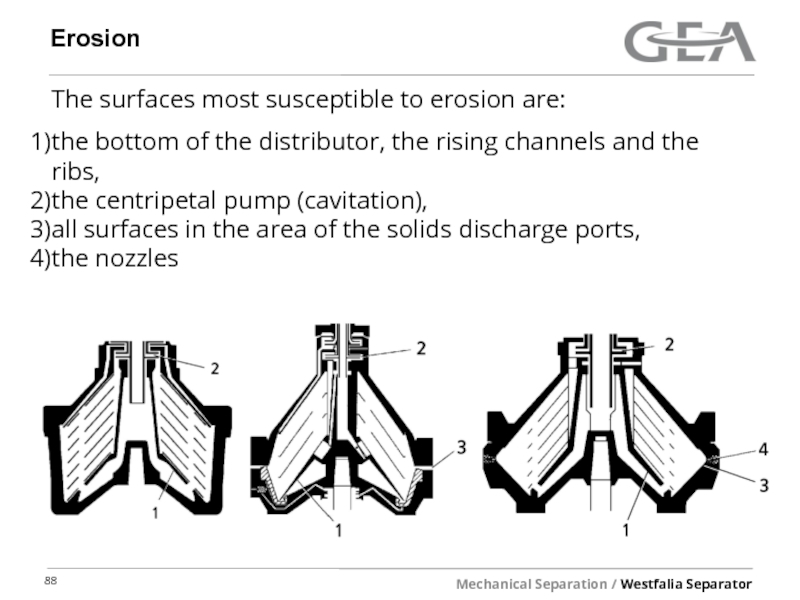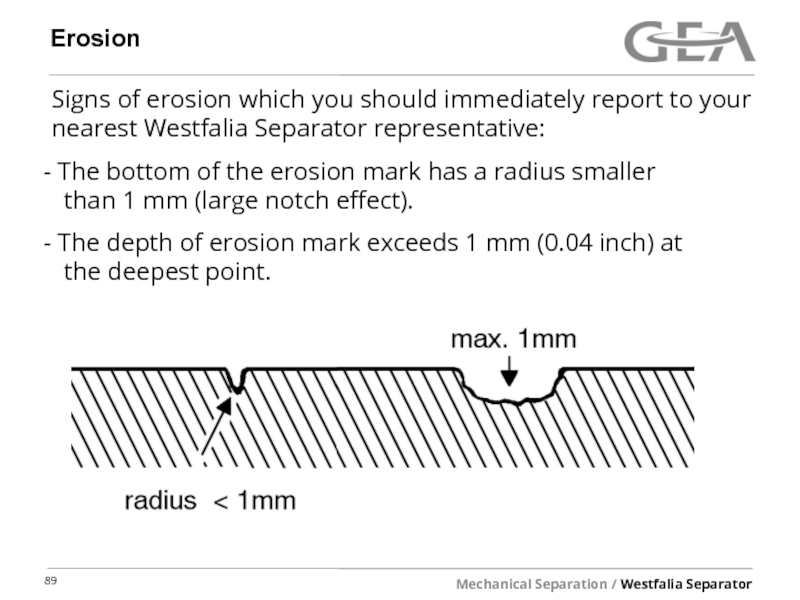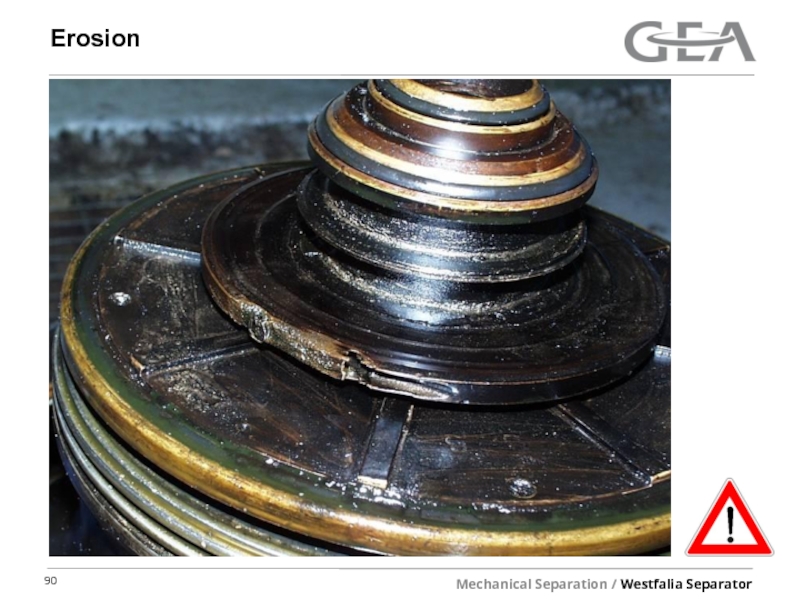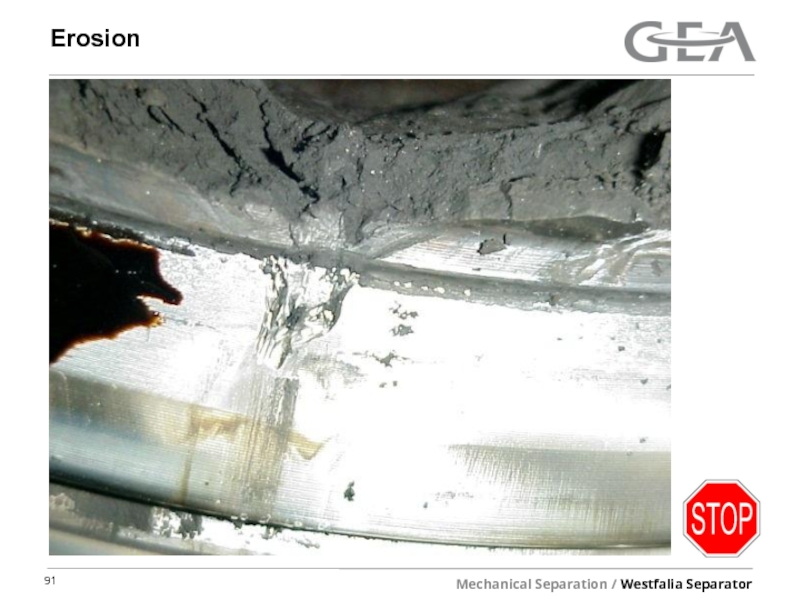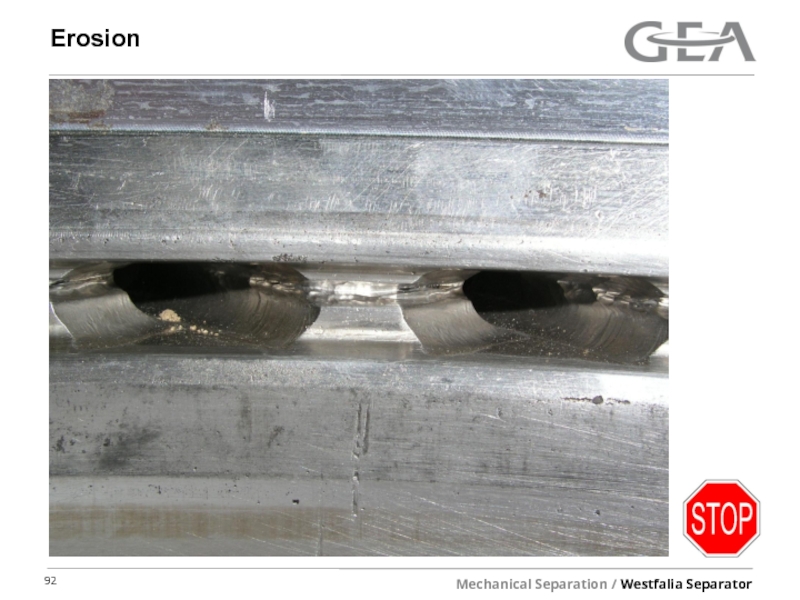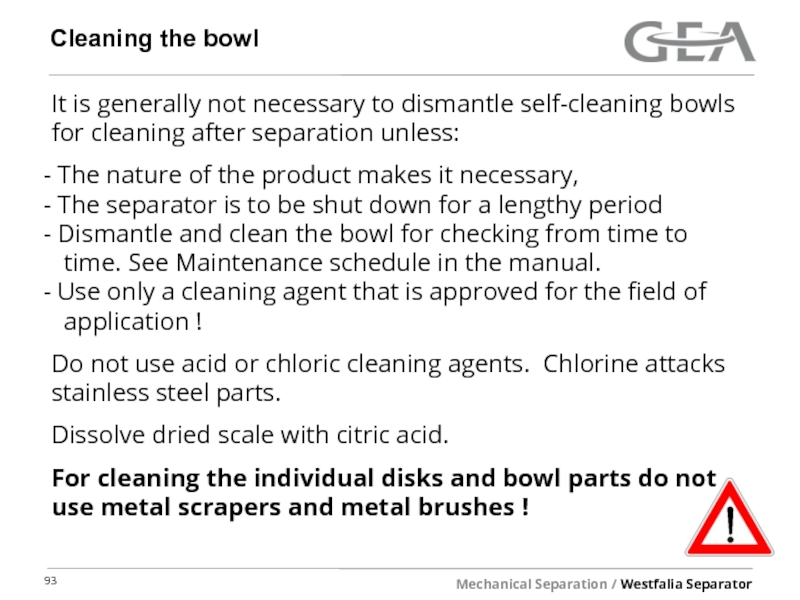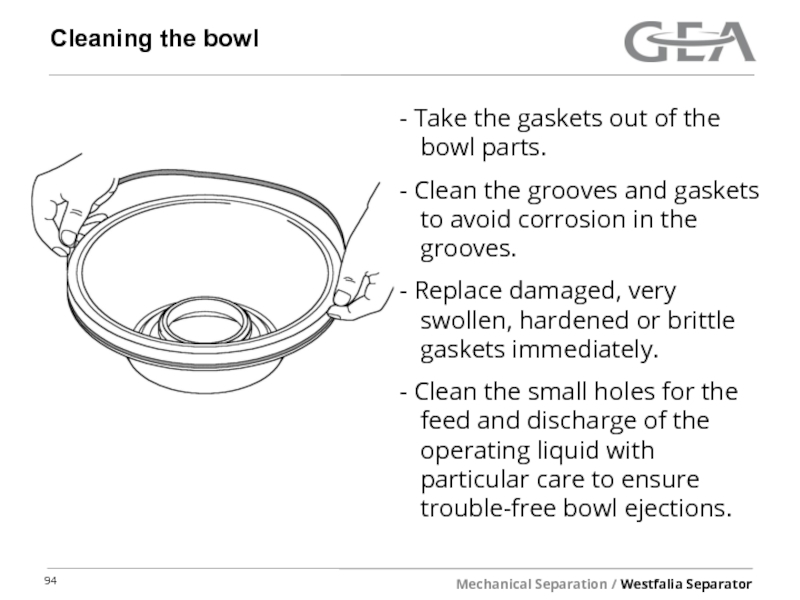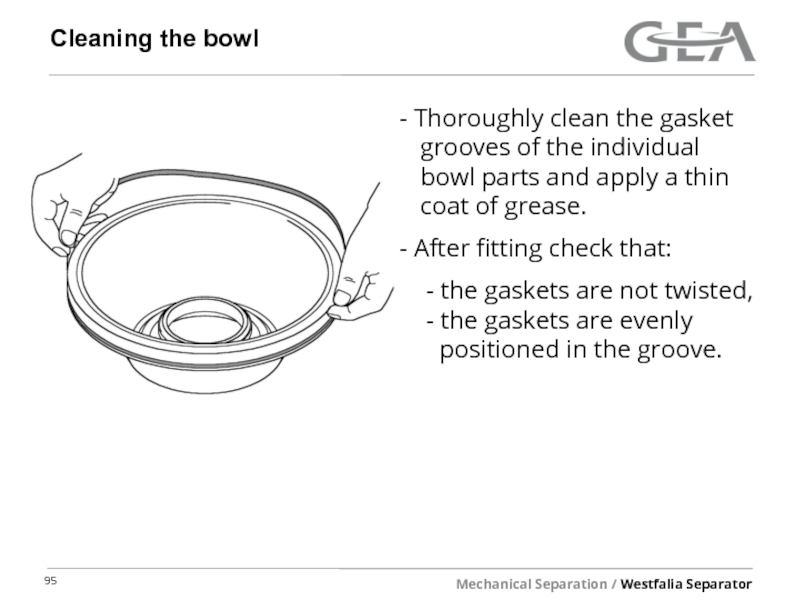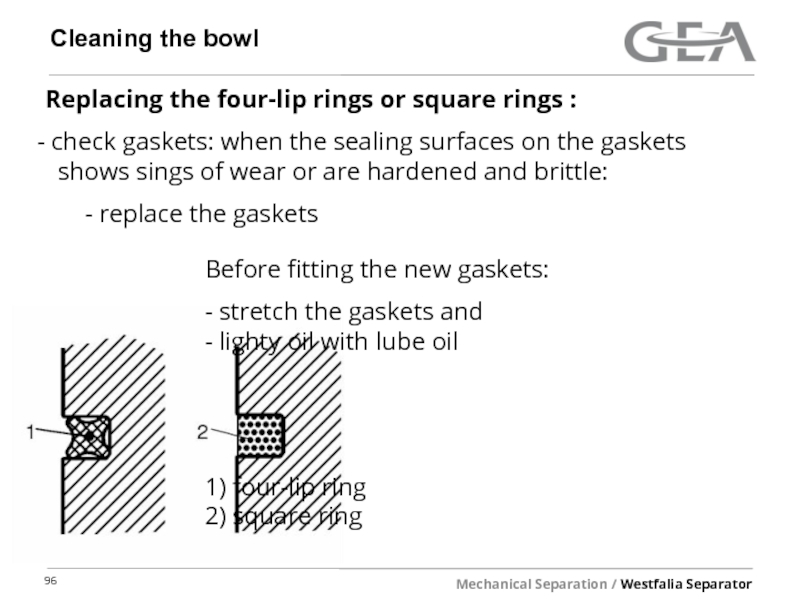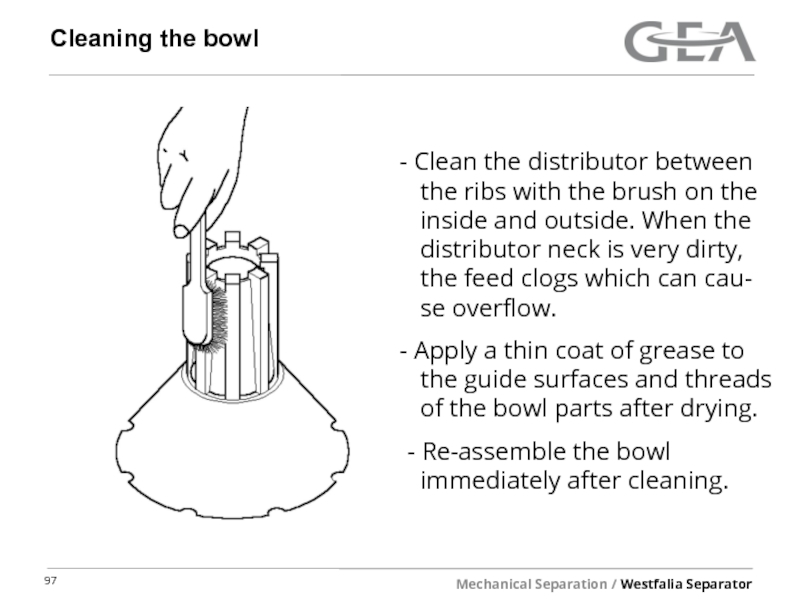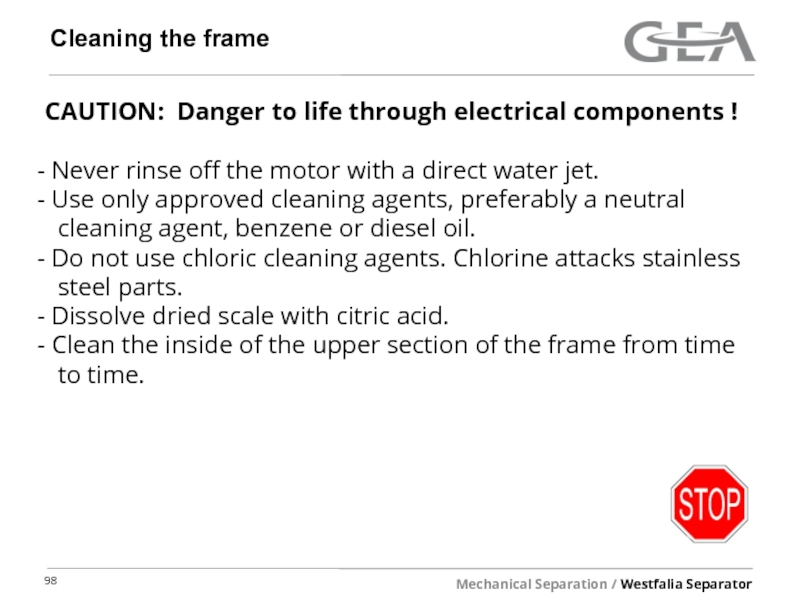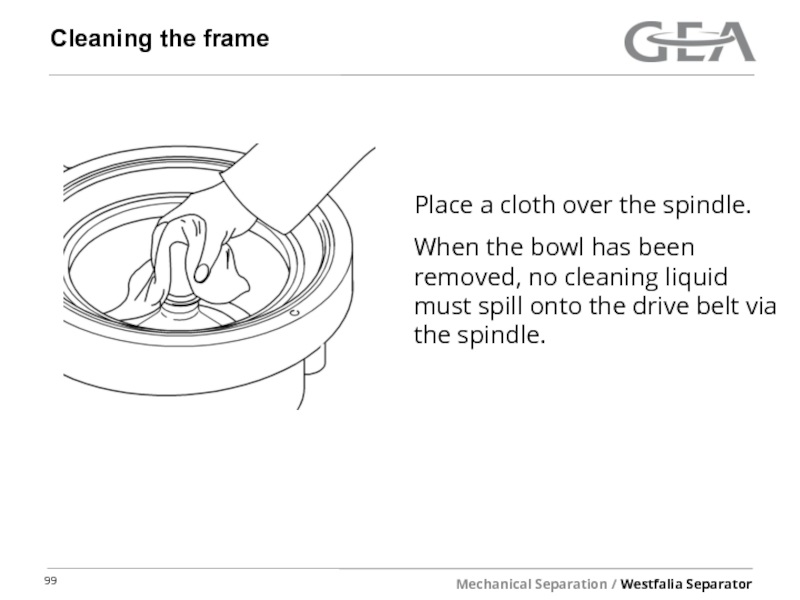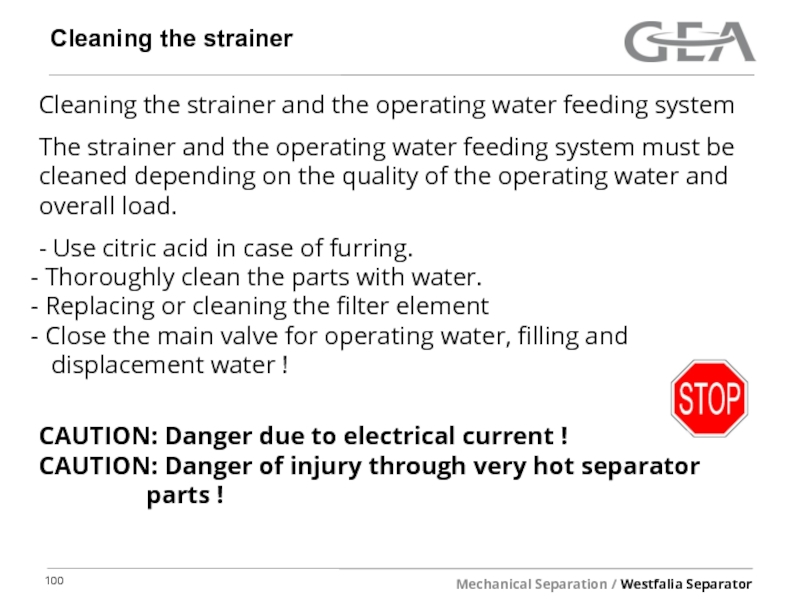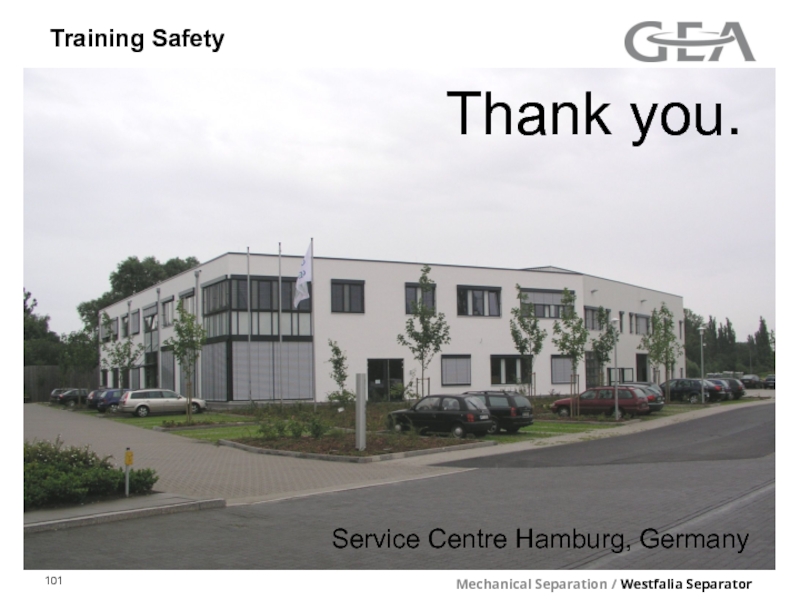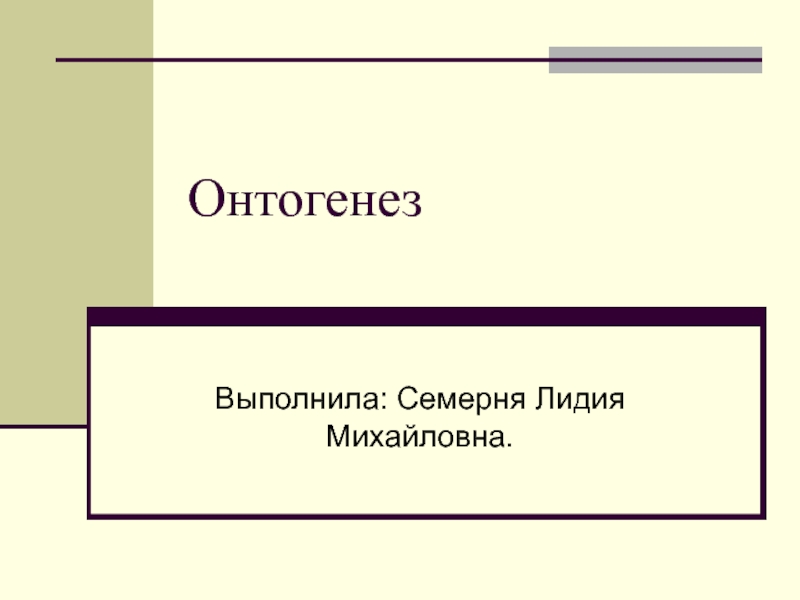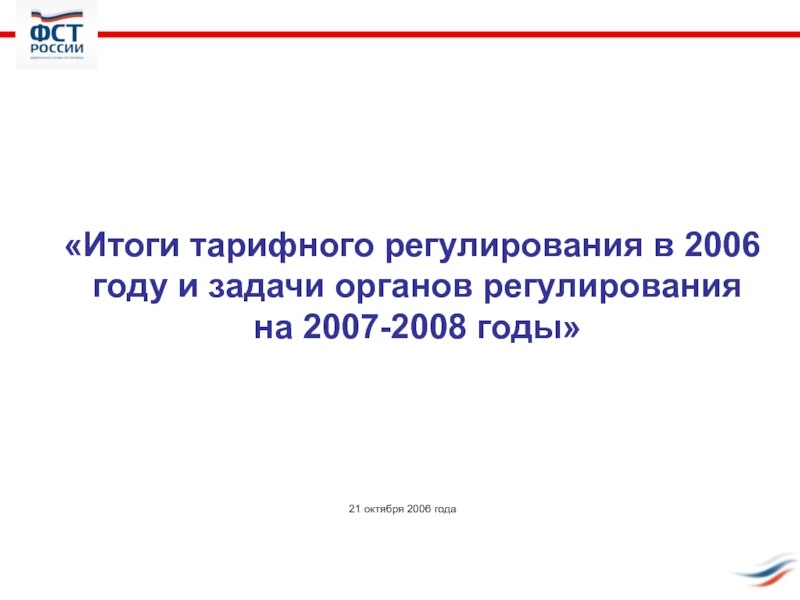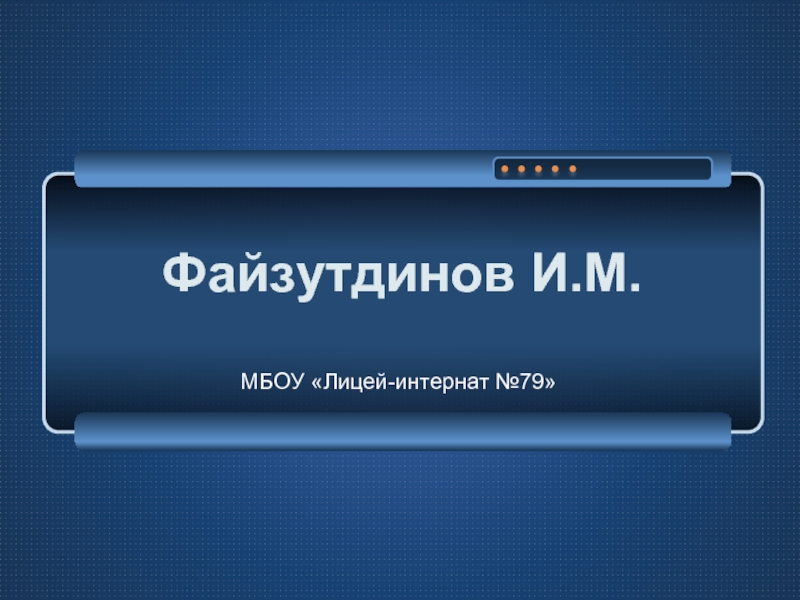General safety rules
Safety markings and their meaning
Correct usage / intended use
Non-compliance with the intended use
Basic operating principles
Operations on the separator
Demands on the operating and maintenance personnel
Spare part requirements
Assembly
Electrical installation
Before start-up
Starting
Shut-down and “Emergency-Off”
Maintenance and repair
Corrosion, Erosion
The health hazards involved when handling HFO and LO
Code of practice and personal protective measures
Cleaning
- Главная
- Разное
- Дизайн
- Бизнес и предпринимательство
- Аналитика
- Образование
- Развлечения
- Красота и здоровье
- Финансы
- Государство
- Путешествия
- Спорт
- Недвижимость
- Армия
- Графика
- Культурология
- Еда и кулинария
- Лингвистика
- Английский язык
- Астрономия
- Алгебра
- Биология
- География
- Детские презентации
- Информатика
- История
- Литература
- Маркетинг
- Математика
- Медицина
- Менеджмент
- Музыка
- МХК
- Немецкий язык
- ОБЖ
- Обществознание
- Окружающий мир
- Педагогика
- Русский язык
- Технология
- Физика
- Философия
- Химия
- Шаблоны, картинки для презентаций
- Экология
- Экономика
- Юриспруденция
Service_Training_safety презентация
Содержание
- 1. Service_Training_safety
- 2. Safety rules For your safety Strictly
- 3. Safety rules Observe the accident prevention regulations
- 4. Safety rules Only qualified or authorized specialized
- 5. Safety markings The safety markings (adhesive and
- 6. Safety markings 1 Safety sticker 2 Oil
- 7. Safety markings The following safety markings must
- 8. Safety markings Refer to the machine documentation
- 9. Safety markings Before carrying out work, disconnect
- 10. Safety markings Before carrying out work on
- 11. Safety markings Danger of life and limb
- 12. Safety markings Warning of unusual noises or
- 13. Safety markings Warning of extreme surface temperatures
- 14. Safety rules Liability for the function of
- 15. Correct usage The separator is designed:
- 16. Correct usage The separator is designed:
- 17. Intended use intended use involves:
- 18. Intended use The contractually agreed conditions
- 19. Non-compliance with the intended use Any use
- 20. Non-compliance with the intended use
- 21. Non-compliance with the intended use The separator
- 22. Basic operating principles Separators are used for
- 23. Operations on the separator The separator works
- 24. Operations on the separator Demands on the
- 25. Operations on the separator Demands on the
- 26. Spare part requirements Use only genuine spare
- 27. Assembly If the
- 28. Assembly Damaged parts
- 29. Assembly CAUTION:
- 30. Assembly CAUTION:
- 31. Assembly Some
- 32. Assembly When
- 33. Assembly When
- 34. Assembly Tighten
- 35. Assembly Tighten
- 36. Assembly Tighten
- 37. Assembly Carefully
- 38. Assembly Check
- 39. Assembly The bowls are balanced in the
- 40. Assembly Beside the separator motor and clutch
- 41. Assembly To avoid unbalance of bowl as
- 42. Assembly In case the bowl is spinning
- 43. Assembly Clean and wipe dry the spindle
- 44. Electrical installation
- 45. Electrical installation
- 46. Before start-up
- 47. Before start-up
- 48. Before start-up
- 49. Before start-up
- 50. Before start-up
- 51. Before start-up
- 52. Starting Refer
- 53. Starting Wear ear protection.
- 54. Starting In
- 55. Starting Do
- 56. Starting - When
- 57. Starting The health
- 58. Starting The health
- 59. Starting The health
- 60. Starting Code of
- 61. Starting When unusual
- 62. Starting Only in
- 63. Shut-down and “Emergency-Off”
- 64. Maintenance and repair
- 65. Maintenance and repair
- 66. Maintenance and repair
- 67. Maintenance and repair
- 68. Maintenance and repair
- 69. Maintenance and repair
- 70. Maintenance and repair
- 71. Maintenance and repair
- 72. Maintenance and repair
- 73. Maintenance and repair
- 74. Maintenance and repair
- 75. Maintenance and repair
- 76. Maintenance and repair
- 77. Maintenance and repair
- 78. Maintenance and repair
- 79. Maintenance and repair
- 80. Corrosion Corrosion can
- 81. Corrosion Possible formation
- 82. Corrosion Pittings which
- 83. Corrosion
- 84. Corrosion
- 85. Corrosion
- 86. Corrosion
- 87. Erosion Erosion is caused by solid particles
- 88. Erosion The surfaces most susceptible to erosion
- 89. Erosion Signs of erosion which you should
- 90. Erosion
- 91. Erosion
- 92. Erosion
- 93. Cleaning the bowl It is generally
- 94. Cleaning the bowl Take the
- 95. Cleaning the bowl Thoroughly clean
- 96. Cleaning the bowl Replacing the four-lip
- 97. Cleaning the bowl Clean the
- 98. Cleaning the frame CAUTION: Danger to life
- 99. Cleaning the frame Place a cloth over
- 100. Cleaning the strainer Cleaning the strainer and
- 101. Training Safety Thank you. Service Centre Hamburg, Germany
Слайд 1Rules of safety
Training: The rules of safety
by Ronald Eschmann, Service Center
Слайд 2Safety rules
For your safety
Strictly adhere to instructions marked with this symbol.
Take special care when carrying out operations marked with this symbol - otherwise danger to life !
This symbol is not a safety precaution but rather a reference to information which help
to better understand the separator or plant
components and the processes.
Слайд 3Safety rules
Observe the accident prevention regulations !
The local safety and
When operating electrical apparatus, certain parts carry dangerous voltage. Before working in electrical components, take adequate preventive measures according to the national provisions (in Germany in accordance with the rules and regulations of the VDE (Verein Deutscher Elektrotechnik / Association of German Electrical Engineering) or of the local electric power company. Non-compliance with the protective measures can result in serious damage to persons or property. Any work on electrical components may only be carried out by an authorized electrician.
Слайд 4Safety rules
Only qualified or authorized specialized staff may operate, maintain and
Follow the instructions in the manual. Follow only the instructions given in the manual. Repair and maintenance work that goes beyond the scope described in this manual may not be carried out.
Operate the separator only in accordance with agreed process and operating parameters.
Maintain the separator as specified in the manual.
Carry out safety checks on the separator.
Слайд 5Safety markings
The safety markings (adhesive and metal plates) are attached to
- Clean dirty safety markings.
- Replace damaged safety markings.
Слайд 7Safety markings
The following safety markings must be attached to the separator
Слайд 8Safety markings
Refer to the machine documentation !
Every person who is assigned
The documentation must be complete kept near to the machine and be readily accessible to the operators. It must be available to the operators at all times !
Слайд 9Safety markings
Before carrying out work, disconnect power to the all components
Risk of injury due to electrical voltage and unintended start-up of the separator !
Слайд 10Safety markings
Before carrying out work on the separator and electrical plant
Make sure the separator is at a
standstill.
Switch off all electrical
appliances via the main switch,
Lock the installation to prevent
it from being accidentally
switched on.
Слайд 11Safety markings
Danger of life and limb through rotating machine parts !
Do not loosen any part and do not carry out maintenance or repair on the separator before the separator is at a standstill !
Слайд 12Safety markings
Warning of unusual noises or vibrations !
When unusual noises
immediately shut down the
separator via “emergency-
stop”
- evacuate the room
Do not re-enter the room until
the centrifuge has come to a
standstill.
Слайд 13Safety markings
Warning of extreme surface temperatures !
The surfaces of the
Note: This adhesive plate is only used for hot operation.
Слайд 14Safety rules
Liability for the function of the machine passes to the
Liability for the function of the machine passes unconditionally to the owner or operator irrespective of existing warranty periods in so far as the machine is improperly maintained or serviced by persons other than Westfalia Separator service personnel or if the machine is not applied in accordance with the intended use.
Westfalia Separator shall not be liable for damage which occurs as a result of non-observance of the above. Warranty and liability conditions in the Conditions of Sale and Delivery of Westfalia Separator are not extended by the above.
Слайд 15Correct usage
The separator is designed:
for a very high bowl speed.
depends on the chemical and physical properties of the
product:
- Temperature
- Density of the fluid and solid components.
- for products which contain no corrosive and erosive
components. The aggressiveness of the product influences
the careful selection of the bowl material. Only products
conforming to the specifications on the nameplate may be
processed.
Слайд 16Correct usage
The separator is designed:
in accordance with the method of
separator agreed with Westfalia Separator. Refer to the
data sheet and contractually agreements.
in accordance with the admissible utilities (cleaning agents,
lubricants, operating liquids etc.) specified in the
documentation or on the data sheet.
Слайд 17Intended use
intended use involves:
paying attention to the safety precautions, the
manual of the separator and the safety markings on the
separator.
adhering to the data on the nameplate, e.g. maximum
admissible bowl speed.
Further information on the intended use of the separator
such as
- agreed areas,
- density of the product,
- throughput capacities,
- temperatures, pressures etc.
is given in the documentation or the data sheet furnished with the documentation.
Слайд 18Intended use
The contractually agreed conditions agreed with Westfalia
Separator
passed on to the operating personnel by the plant operator.
Any operating mode deviating from this is not intended use and can result in severe damage to property and persons !
Слайд 19Non-compliance with the intended use
Any use that deviates from the intended
considered to be non-compliant. Non-compliance with intended use can result in severe damage to property and persons !
The separator may not be operated by:
Persons who have not read and understood these basic
safety precautions.
Persons who have not read and understood the instruction
manual of the separator.
Persons who have not been briefed on proper and correct
operation.
Persons who have not been adequately trained.
Persons who have not reached the minimum age of 18
years.
Слайд 21Non-compliance with the intended use
The separator may not be operated by:
the nameplate.
Product with excessively high density.
Solids with excessively high density.
Product with excessively high temperature.
When the max. admissible bowl speed has been exceeded
through e.g. manipulation of the drive.
in an incomplete state of assembly
- e.g. required supervisory equipment is not activated
or has been switched off.
- the required safety and/or protective covers have not been installed.
When the separator is operated with spare parts which does
not come from Westfalia Separator.
Слайд 22Basic operating principles
Separators are used for the separation of liquid mixtures
High centrifugal forces are produced in the rotating bowl. Under the influence of the centrifugal forces, separation of the liquid mixture and/or ejection of the solids particles takes place most rapidly.
The specifically heavier components are displaced to the bowl periphery, whereas the specifically lighter components are displaced towards the centre of the bowl. The high centrifugal force is produced by very high bowl speeds. On the one hand, high bowl speeds signify high efficiency, while on the other hand, they signify high material stressing of the separator.
Слайд 23Operations on the separator
The separator works reliably, provided that it is
Special attention must be given to:
Assembly
Electrical installation
Before start-up
Start-up
Shut-down
Maintenance and repair
Слайд 24Operations on the separator
Demands on the operating and maintenance personnel:
Operating, maintaining
CAUTION ! Operating, maintenance or repair work by unqualified or unauthorized personnel can lead to operating, assembly and handling errors and severe damage to persons and property.
Westfalia Separator accepts no liability for damage caused by unqualified or unauthorized personnel !
Слайд 25Operations on the separator
Demands on the operating and maintenance personnel:
The operator
is responsible for the necessary skills and knowledge of the
personnel.
is responsible for briefing and training the personnel.
must be sure that the personnel have read and understood
the manuals necessary to carry out their work.
Electrical work may only be carried out by an authorized
electrician !
Westfalia Separator offers an extensive range of training and advanced training courses. You can obtain further information from Westfalia Separator or from one of the authorized representatives.
Слайд 26Spare part requirements
Use only genuine spare parts from Westfalia Separator.
The
safety risks,
less durability and availability,
increased service requirement.
If a safety risk occurs when using non-original spare parts, this may have legal consequences for the responsible persons. In such cases, Westfalia Separator accepts no liability or warranty claims.
Слайд 27Assembly
If the plant has several centrifuges, be careful not to interchange
Слайд 29Assembly
CAUTION:
Some bowl parts may be pre-assembled and balanced only by specialists
Unqualified balancing can lead to dangerous operating states (vibrations) and destruction of the separator with danger to life.
Слайд 30Assembly
CAUTION:
To avoid unbalance, when replacing some bowl parts like:
Lock ring
Distributor
Bowl bottom
Water chamber bottom
Westfalia Separator must be consulted. These parts are marked with a footnote in the separator manual.
Слайд 31Assembly
Some bowl parts are
arranged in fixed positions
Locking devices and
alignment marks must be in
perfect condition. The bowl
must otherwise not be
operated.
Слайд 33Assembly
When assembling the bowl,
be sure to strictly adhere
the assembly instructions in
order to avoid undue
imbalance.
Before starting the bowl,
be sure to fit all parts.
Слайд 34Assembly
Tighten the bowl lock ring
securely: the "O" marks
the bowl bottom or bowl
top and on the lock ring
must be in line with each
other.
Pay attention to the
position of the marks !
CAUTION: A loose lock ring can endanger life !
Слайд 35Assembly
Tighten the spindle screw
with the separator-specific
torque
CAUTION: A loose spindle screw can endanger life !
Слайд 36Assembly
Tighten the centripetal
pump chamber lock ring
securely
CAUTION: A loose lock ring can endanger life !
Слайд 39Assembly
The bowls are balanced in the factory at the balancing rim
It may become necessary to send the bowl for re-balancing after replacing certain bowl parts.
Слайд 40Assembly
Beside the separator motor and clutch the bowl might by a
Left hand thread !
Слайд 41Assembly
To avoid unbalance of bowl as a result of the interchange
Слайд 42Assembly
In case the bowl is spinning for a longer period of
Overheating quite often means the total loss of the bowl. Westfalia keeps a certain number of loan / exchange bowl in stock. A repair is possible in one of our certified workshops.
max. 30 min
Слайд 43Assembly
Clean and wipe dry the spindle cone as well as the
Слайд 44Electrical installation
Electrical work may only be
carried out by
authorized electrician !
The governing accident
prevention regulations
apply for the electrical
appliances and installations.
Special attention must be
paid to the installation
guidelines of Westfalia
Separator.
Слайд 45Electrical installation
The frequency and voltage
of the power supply
correspond to the machine
specifications.
carry out voltage equalization
Observe legal regulations
e.g. in the EU:
Low-voltage guideline
73/23/EWG
Electro-magnetic compatibility
89/336/EWG.
Guidelines of the
classification societies.
Слайд 46Before start-up
Check that the bowl lock
ring has been
tightened.
The "O" marks on bowl
bottom or bowl top and on
the lock ring must be
aligned.
Слайд 47Before start-up
The bowl must rotate in
clockwise direction (see
arrow on frame, solids
collector or electric motor).
Слайд 48Before start-up
The separator may only be
operated with protection
devices conforming to EN
294.
Equip solid and liquid
discharges accordingly
where appropriate.
Слайд 50Before start-up
Check whether the
supervisory equipment is
operational
limit values are adjusted.
When hoods, concentrate
collectors and vessels are
pressurized, e.g. by inert gas
blanketing, cooling, steam
sterilization etc. the
pressures stated on the
boiler plate must not be
exceeded.
Слайд 51Before start-up
Check that the product lines
are set to
Regularly check hoses for
signs of ageing.
Check sight glasses for
mechanical damage.
Damaged parts must be
replaced immediately by
new or reconditioned parts.
Слайд 52Starting
Refer to chapter “operation”
Note nameplate:
The values
- bowl speed,
density of the heavy liquid,
density of the solids
(centrifugally dry) are
maximum values and must
not be exceeded.
Слайд 54Starting
In case of frequency converter
operation:
Do not under
circumstances manipulate the
frequency converter to
exceed the permissible bowl
speed (see nameplate).
The separator may only be
operated with an
independent device for speed
limiting.
Слайд 55Starting
Do not feed product which is
categorised as explosive.
used in areas where explosion
protection is required.
Слайд 56Starting
- When processing products
harmful to persons, observe
the
regulations.
Refer to the safety data sheet
of the product.
- Wear protective clothing.
Слайд 57Starting
The health hazards involved when handling heavy oils and lube oils
As a result of the deterioration in quality of fuel oils, the danger has arisen that the heavy oils used on board contain greater amounts of substances injurious to health. These include:
polycyclic aromatic hydrocarbons,
lead compounds,
chemical residues.
Слайд 58Starting
The health hazards involved when handling heavy oils and lube oils
An increased amount of polycyclic aromatic hydrocarbons is also present in used lube oils (waste oils). The health hazards for the engine room staff depend to a large extent
on the concentrations of the dangerous substances,
the ambient air (inhalation of oil vapours/oil mist),
the intensity and duration of the contact with the skin or
mucous membrane.
Слайд 59Starting
The health hazards involved when handling heavy oils and lube oils
Possible short-term effects:
headaches, dizziness, nausea, itching or burning of the skin
Possible long-term effects:
allergic reactions, especially skin allergies,
festering inflammation of the skin pores (oil-acne),
damage to the central nervous system after inhalation over
a long period,
skin cancer caused by direct skin contact over a long
period,
Lung cancer or cancer of the digestive organs after
inhalation over a long period (not certain as the causes are
difficult to separate from the effects of smoking and
alcohol).
Слайд 60Starting
Code of practice and personal protective measures
Avoid skin contact with
Wear suitable protective gloves.
Apply a protective ointment to the skin, especially if no
protective gloves are worn ! Personal hygiene is of the
utmost importance!
Avoid breathing in oil vapours if possible !
If possible, improve the air circulation in the room ! Fully
open the air regulation flaps in the outlets of the air
supply ducts in the centrifuge and filter area.
Wash affected areas of skin frequently and thoroughly !
Change dirty overalls regularly !
Exercise special care when carrying out maintenance work
on and cleaning heavy oil and lube oil centrifuges and
filters !
Слайд 61Starting
When unusual noises or vibrations occur on the separator:
Immediately shut
separator with filled bowl via
“emergency-off”.
Never trigger a bowl ejection !
Evacuate the room.
Do not re-enter the room
until the centrifuge has come
to a standstill.
Слайд 62Starting
Only in case of hot operation:
Product-contacting parts such
as:
- hood,
- solids catcher
reach temperatures over 80 °C (176 °F).
Слайд 63Shut-down and “Emergency-Off”
For shut-down refer to the
chapter "Operation"
manual and follow the start-up
and shut-down instructions.
In a hazardous situation, press
the emergency-off button.
The emergency-off button is
on the control cabinet (see
electrical documentation).
Слайд 64Maintenance and repair
Unfavourable operating conditions may require shorter maintenance intervals. The
aggressive product (chemical or physical)
high product temperature
product with grease-decaying properties
environment: temperature, dust, vapours
Слайд 65Maintenance and repair
Particularly high-stressed
separator parts like:
-
- Bowl bottom,
- Bowl top and
- other bowl parts with a large
outer diameter must be
checked regularly to assure
safe and efficient operation.
Слайд 66Maintenance and repair
Timely maintenance of the separator and replacement of worn
Use only genuine spare parts from Westfalia Separator.
Otherwise, safety risks may arise.
Carry out the required cleaning thoroughly.
One-sided solid deposits in the bowl cause severe unbalance !
Maintenance and repair work may only be carried out to the extent described in the instruction manual. Maintenance and repair work not described in this manual may only be carried out by the manufacturer or by "repair shops" authorized by the manufacturer. We, therefore, recommend in your own interest to have your separator inspected by our service engineers at regular intervals. These checks help to maintain the operating safety and avoid unexpected downtime.
Слайд 67Maintenance and repair
Before carrying out work on the separator and electrical
Make sure the separator is at a
standstill.
Switch off all electrical
appliances via the main switch, - Lock the installation to
prevent it from being
accidentally switched on.
Слайд 68Maintenance and repair
Do not loosen any part and do not carry
Слайд 69Maintenance and repair
CAUTION:
Danger of life through rotating separator parts !
In case
No parts of the separator may be lossened before the bowl
has come to a standstill.
The run-down time without drive belt (see table below)
until dismantling the separator must be observed !
- Applying the brake is uneffective !
Слайд 70Maintenance and repair
Do not climb onto or stand on
machine.
Make provision for and use a
sturdy working platform.
Слайд 71Maintenance and repair
Place dismantled machine
parts on a suitable
rubber mat.
Secure the machine parts
against overturning and rolling
away with suitable aids.
Слайд 72Maintenance and repair
Do not heat bowl parts with
the naked flame.
Bowl parts must never be
welded. This also applies for
hood and solids catcher parts
of steam-sterilizable
separators.
Even during cleaning the bowl
parts the temperature must
not exceed 100 °C (212 °F).
Слайд 73Maintenance and repair
Load-carrying equipment such as:
lifting devices for bowl or
distributor,
chains etc.
may only be used for work routines as described in the instruction manual.
Do not use damaged or incomplete load carrying equipment.
Слайд 74Maintenance and repair
All load suspension devices
have to be
completeness and for possible
damage at least once a year.
In addition, when using load
suspension devices and hoists,
the applicable legislation and
safety rules have to be strictly
observed.
Слайд 75Maintenance and repair
Collect dripping oil to prevent
danger of
infection.
When handling waste oils
note:
- They can be injurious to
health, depending on their
chemical composition.
- Waste oil must be disposed
of in accordance with local
regulations.
Слайд 80Corrosion
Corrosion can also affect bowl parts made of stainless steel. This
Corrosion on stainless steel bowl material should be examined thoroughly and documented. Flat-spread corrosion can usually be measured (reduction of wall thickness).
Pit- or crack-shaped corrosion cannot be measured without the risk of damage. At the initial stage pit-shaped corrosion is generally caused by chlorine ions (seawater !). Depending on the stressing of the part, pit-shaped corrosion can result in crack-shaped corrosion.
Слайд 81Corrosion
Possible formation of pit-shaped corrosion.
In case of crack-shaped corrosion attack
Such pittings can only be investigated by a materials expert. Contact your nearest Westfalia Separator representative for a thorough examination.
Слайд 82Corrosion
Pittings which are close together or form a linear pattern can
Слайд 87Erosion
Erosion is caused by solid particles in the process liquid.
These
hard solids particles
high throughput capacities
The first signs of erosion should be carefully observed and documented. Erosion can deepen rapidly, thereby weakening the bowl material.
Contact your nearest Westfalia Separator representative for a thorough examination. Information on the nature of the damage can be provided by photos, plaster casts or lead molds.
Слайд 88Erosion
The surfaces most susceptible to erosion are:
the bottom of the distributor,
the centripetal pump (cavitation),
all surfaces in the area of the solids discharge ports,
the nozzles
Слайд 89Erosion
Signs of erosion which you should immediately report to your nearest
The bottom of the erosion mark has a radius smaller
than 1 mm (large notch effect).
The depth of erosion mark exceeds 1 mm (0.04 inch) at
the deepest point.
Слайд 93Cleaning the bowl
It is generally not necessary to dismantle self-cleaning
The nature of the product makes it necessary,
The separator is to be shut down for a lengthy period
Dismantle and clean the bowl for checking from time to
time. See Maintenance schedule in the manual.
Use only a cleaning agent that is approved for the field of
application !
Do not use acid or chloric cleaning agents. Chlorine attacks stainless steel parts.
Dissolve dried scale with citric acid.
For cleaning the individual disks and bowl parts do not use metal scrapers and metal brushes !
Слайд 94Cleaning the bowl
Take the gaskets out of the
Clean the grooves and gaskets
to avoid corrosion in the
grooves.
Replace damaged, very
swollen, hardened or brittle
gaskets immediately.
Clean the small holes for the
feed and discharge of the
operating liquid with
particular care to ensure
trouble-free bowl ejections.
Слайд 95Cleaning the bowl
Thoroughly clean the gasket
grooves of
bowl parts and apply a thin
coat of grease.
After fitting check that:
- the gaskets are not twisted,
- the gaskets are evenly
positioned in the groove.
Слайд 96Cleaning the bowl
Replacing the four-lip rings or square rings :
shows sings of wear or are hardened and brittle:
- replace the gaskets
Before fitting the new gaskets:
- stretch the gaskets and
- lighty oil with lube oil
1) four-lip ring
2) square ring
Слайд 97Cleaning the bowl
Clean the distributor between
the ribs
inside and outside. When the
distributor neck is very dirty,
the feed clogs which can cau-
se overflow.
Apply a thin coat of grease to
the guide surfaces and threads
of the bowl parts after drying.
- Re-assemble the bowl
immediately after cleaning.
Слайд 98Cleaning the frame
CAUTION: Danger to life through electrical components !
Use only approved cleaning agents, preferably a neutral
cleaning agent, benzene or diesel oil.
Do not use chloric cleaning agents. Chlorine attacks stainless
steel parts.
Dissolve dried scale with citric acid.
Clean the inside of the upper section of the frame from time
to time.
Слайд 99Cleaning the frame
Place a cloth over the spindle.
When the bowl
Слайд 100Cleaning the strainer
Cleaning the strainer and the operating water feeding system
The
- Use citric acid in case of furring.
Thoroughly clean the parts with water.
Replacing or cleaning the filter element
Close the main valve for operating water, filling and
displacement water !
CAUTION: Danger due to electrical current !
CAUTION: Danger of injury through very hot separator
parts !
